Recent Fire Damage Posts
Fire Damage Protocol
8/7/2024 (Permalink)
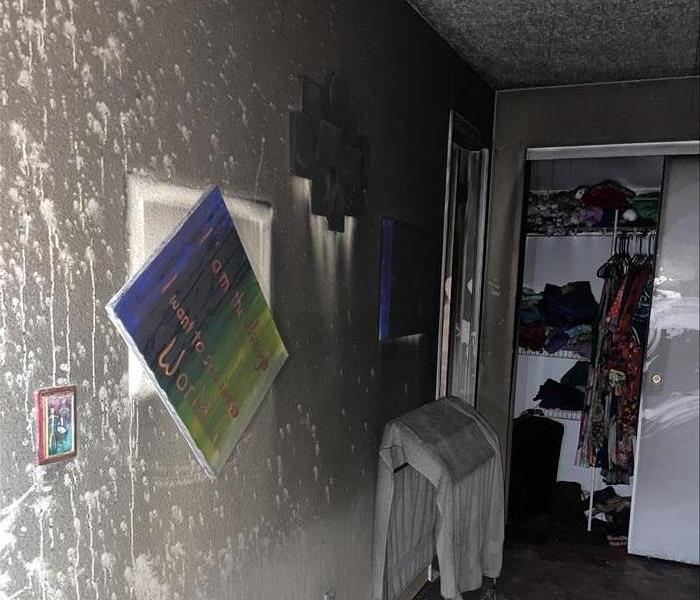 A bedroom showing visible fire damage with soot coating the walls
A bedroom showing visible fire damage with soot coating the walls
If you’re dealing with fire damage, it’s important to address both the immediate and long-term impacts to ensure safety and facilitate recovery. Here’s a guide to help you navigate the process:
Immediately After a Fire
- Ensure Safety
- Do Not Enter: Only re-enter your property when authorities declare it safe.
- Check for Hazards: Look for structural damage, gas leaks, and electrical issues before re-entering.
- Contact Authorities and Insurance
- Fire Department: Obtain a copy of the fire report.
- Insurance Company: Report the damage and start the claims process. Provide detailed information and documentation.
- Call SERVPRO Vancouver E./W.
- Dial (360)254-0049 to reach the office for assistance and information
- Document Damage
- Photographs and Videos: Capture all damage to help with insurance claims and recovery.
- Inventory: List damaged or destroyed items for insurance purposes.
- Secure the Property
- Board Up: If windows and doors are damaged, board them up to prevent further entry and vandalism.
- Cover Roof and Walls: Use tarps or other protective coverings to prevent weather damage.
Cleanup and Restoration
- Remove Debris
- Safety First: Wear protective gear (gloves, masks, etc.) to avoid injury from debris and exposure to hazardous materials.
- Salvage Items: Separate salvageable items from debris. Be cautious with items that may be contaminated or hazardous.
- Address Smoke and Soot Damage
- Ventilation: Open windows and use fans to ventilate and reduce smoke odor.
- Clean Surfaces: Use specialized cleaners for soot and smoke residue. Avoid using regular cleaning products that can push soot deeper into surfaces.
- Inspect for Water Damage
- Check for Leaks: Firefighting efforts can lead to water damage. Inspect for leaks, mold, and mildew.
- Dry Out: Use dehumidifiers and fans to dry out affected areas.
Handling fire damage requires a careful approach to ensure safety, address immediate concerns, and plan for recovery. SERVPRO Vancouver E./W. is here to help you manage these steps!
Top 3 Things to Throw Out After a Fire
8/29/2023 (Permalink)
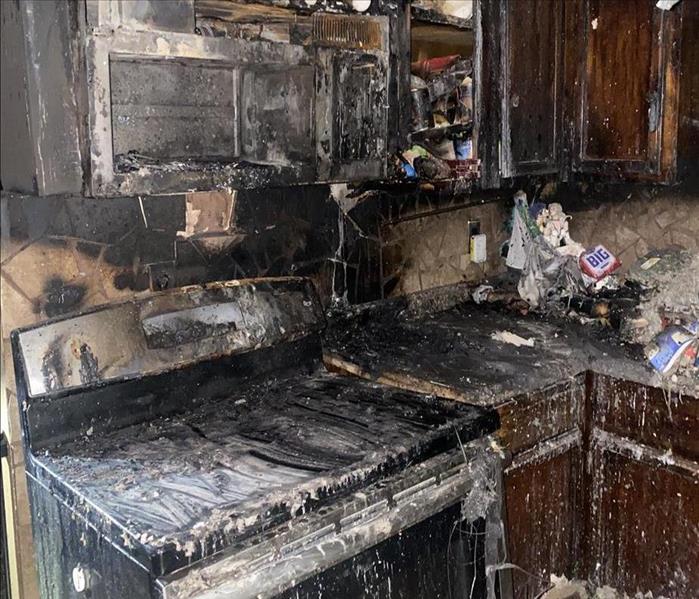 Fire damage left in the aftermath of a residential kitchen fire
Fire damage left in the aftermath of a residential kitchen fire
Items that Need to Be Thrown Out After a Fire
When a fire occurs in your home in Salmon Creek, WA, the process of cleaning up can be daunting. Often, people are unsure of what to throw away. There are several types of items that are often damaged in fires, and they commonly need to be thrown out.
1. Cosmetics
Cosmetics, even if they are packaged, generally need to be stored in clean, cool environments to remain in good condition. Unfortunately, high heat from a fire can cause the packaging of many items, and the items themselves, to melt. As a result, smoke and soot can easily damage the cosmetics, making them unsafe to use.
2. Food
After a fire, it’s often best to throw away the majority of food items in your home. Though some items may be visibly damaged, especially if the fire occurred in the kitchen, some pieces of food may appear to be unharmed. However, even if items are canned or wrapped up, smoke and soot can still affect the quality of food, and consuming food that has been harmed by soot or smoke damage can be hazardous. If you’re unsure whether or not food has been harmed, it’s generally best to discard the item.
3. Medication
Many medications need to be stored in relatively cool environments, and some medications may need to be stored in a refrigerator. During a fire, the temperature in a house can quickly rise. The high heat from a fire can damage the overall quality of the medication, which can ultimately make the medication ineffective and unsafe to consume. If you can document the medications that need to be replaced, you may be able to receive compensation from your insurance company.
Knowing that you may need to throw away cosmetics, food, and medication after a fire can help make the process of sorting through your belongings easier. Often, homeowners whose homes have sustained damage from fires find it useful to work with fire damage restoration experts.
Fire Precautions
7/26/2023 (Permalink)
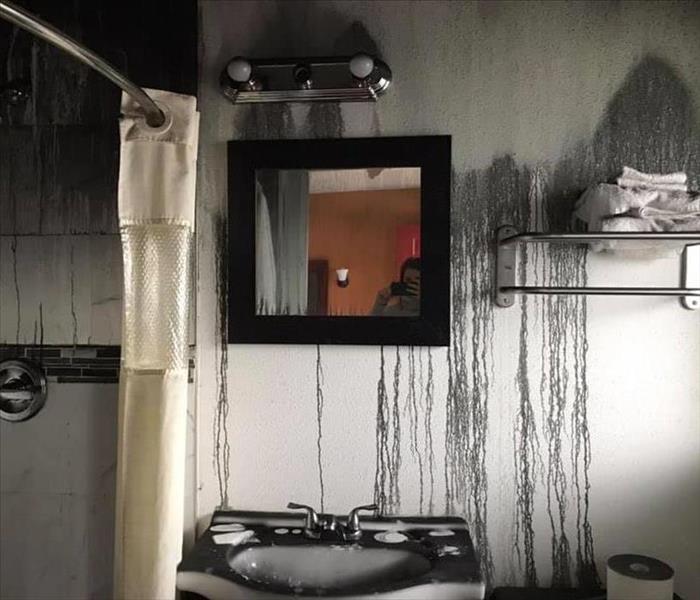 Residue left in a bathroom from a fire that occurred in a residential home.
Residue left in a bathroom from a fire that occurred in a residential home.
House fires can be devastating, but there are steps you can take to reduce the risk of a fire starting in your home. The following are some precautions you can take to keep your home and family safe.
1. Install and maintain smoke detectors:
Smoke detectors are essential in every home. They can detect smoke and alert you to a fire before it gets out of control. Make sure you have smoke detectors installed in every room of your home, especially in the kitchen and near bedrooms. Also make sure to maintain all smoke detectors in your home. You can have smoke detectors but they will be of no help if not maintained properly.
2. Have a fire extinguisher:
Keep a fire extinguisher in an easily accessible location in case of a small fire. Make sure you know how to use it and that it is up to date.
3. Keep flammable materials away from heat sources:
Keep flammable materials such as curtains, paper, and cleaning supplies away from heat sources such as stoves, heaters, and candles.
4. Don't leave cooking unattended:
Cooking is the leading cause of house fires. Never leave cooking unattended, and keep a close eye on the stove and oven.
5. Don't overload electrical outlets:
Overloading electrical outlets can cause a fire. Make sure you don't have too many appliances plugged into one outlet and use surge protectors.
6. Have an escape plan:
Make sure you have an escape plan in case of a fire. Practice the plan with your family so everyone knows what to do in case of an emergency.
By taking these precautions, you can reduce the risk of a fire starting in your home and keep your family safe in the event of a fire occurring.
After a Fire, Wait Until Help Arrives
7/21/2022 (Permalink)
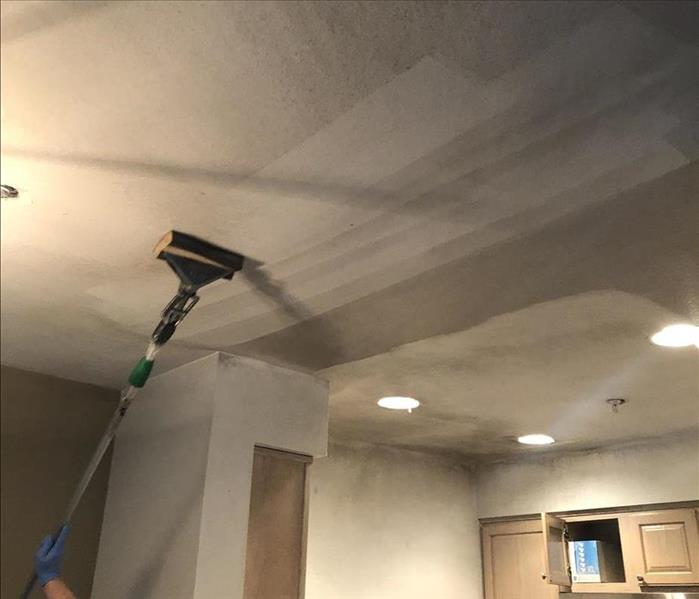 Call for questions concerning a fire damage, we're happy to give tips and provide resources.
Call for questions concerning a fire damage, we're happy to give tips and provide resources.
After experiencing fire damage to the home, it’s understandable if most homeowners want to clean it up themselves. However, homeowners run the risk of further damaging your home if not cleaned properly. When in doubt, call SERVPRO of Vancouver/ Clark County.
Until we arrive, keep these things in mind
- Limit movement in the home as much as possible to prevent further damage.
- Place clean towels or linens on carpeted areas to prevent more soiling.
- Always keep your hands clean to avoid spreading soot around the home.
- Do not attempt to wash walls or painted surfaces.
- Do not attempt to shampoo carpet or other surfaces.
- Do not attempt to clean electrical appliances.
SERVPRO of Vancouver/ Clark County understands how much your home means to you. Our 24 hour, 7 days a week availability allows us to respond quickly. Our team of experts make fire damage “Like it never even happened.” Call us today at (360) 254-0049
Types of Smoke & Why to Call a Professional
7/21/2022 (Permalink)
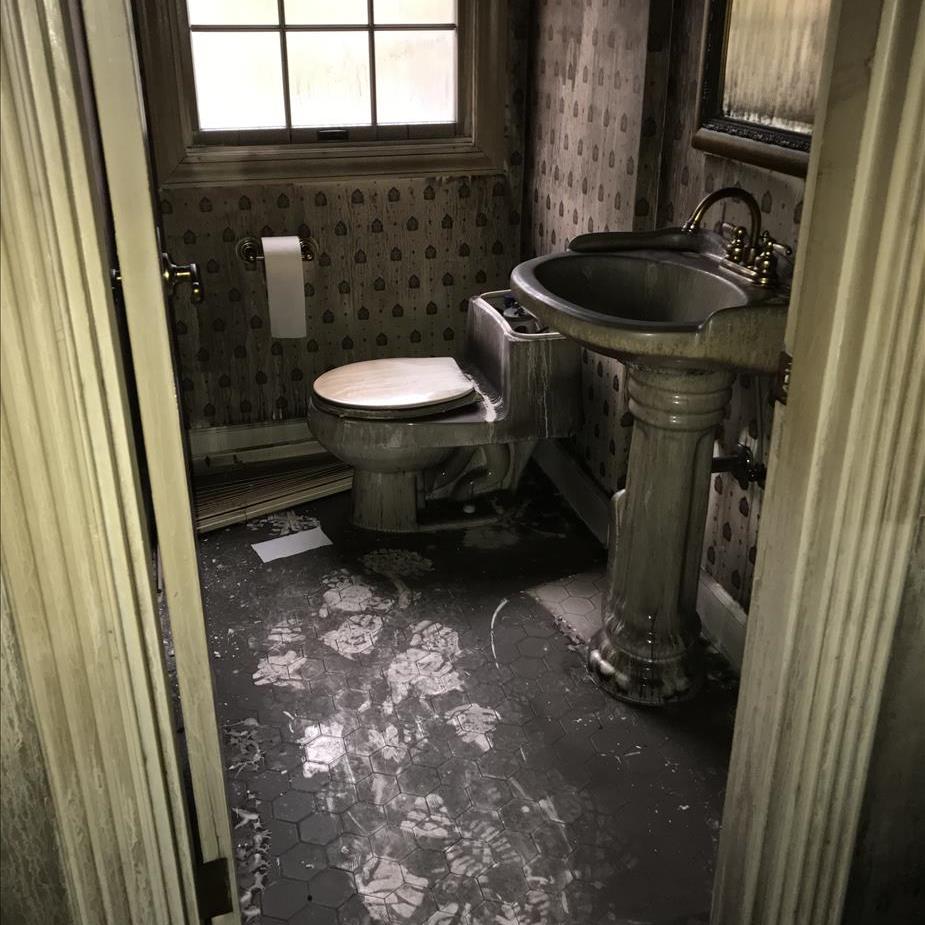 Our technicians have experience, both tested and in the field. Knowledge is power, so gain control back by calling SERVPRO of Vancouver/ Clark County.
Our technicians have experience, both tested and in the field. Knowledge is power, so gain control back by calling SERVPRO of Vancouver/ Clark County.
After a fire, aside from the the more obvious damage to your home or business there is another silent factor; smoke. Depending on the type of smoke, it may greatly affect the restoration process. SERVPRO technicians are thoroughly trained in fire cleanup and restoration and know the different types of smoke which is vital to proper restoration.
Wet Smoke (Plastic & Rubber)
Low heat, smoldering, pungent odor, sticky, smeary. Smoke webs are more difficult to clean.
Dry Smoke (Paper & Wood)
Fast-burning, high temperatures; heat rises, therefore smoke rises.
Protein Fire Residue (Produced by evaporation of material rather than from a fire)
Virtually invisible, discolors paints and varnishes, extreme pungent odor.
Fuel Oil Soot (Furnace Puff Backs)
While "puff backs" can create havoc for homeowners SERVPRO technicians can, in most cases, restore the contents and structure quickly.
Other Types (Tear gas, fingerprint powder, and fire extinguisher residue)
Special loss situations require special care.
If your home or business suffers fire or smoke damage, contact SERRVPRO of Vancouver/ Clark County, we are trained to handle even the toughest losses here to help make it “Like it never even happened.”
Residential Fire Statistics
6/16/2022 (Permalink)
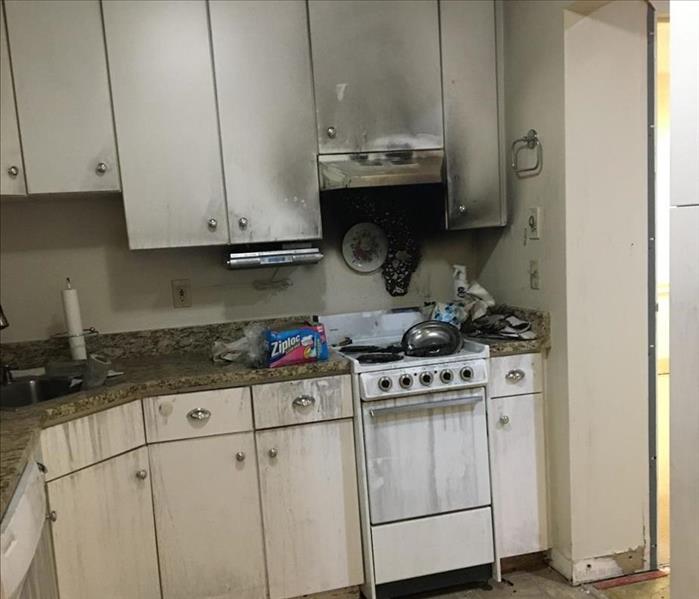 Contact SERVPRO® of Vancouver/Clark County (360) 254-0049 if you do experience damages from a house fire.
Contact SERVPRO® of Vancouver/Clark County (360) 254-0049 if you do experience damages from a house fire.
In life, especially during your youth, there are many different reasons you might hear the phrase, “Don’t become a statistic.” Often, that advice is trying to deter you from getting in trouble; warning against drinking, drugs, or other illicit activities. In life there are other dangers for which everyone should avoid becoming a statistic - one of the scariest being fires.
The following is a list of various home fire statistics (published in 2017) for you to consider.
- Between 2011-2015, U.S. fire departments responded to an average of 358,500 home structure fires with an annual average of
- 2,510 civilian fire deaths
- 12,300 civilian fire injuries
- $6.7 billion in direct damage
- The leading causes of home structure fires are
- Intentional
- Electrical distribution and lighting equipment
- Heating equipment
- Cooking equipment
- Smoking materials
- The leading origins of these fires are
- Kitchen or cooking area
- Bedroom
- Confined chimney or flue fire
- Living room, family room or den
- People between the ages of 25-64 have a greater risk of death or injury in a house structure fire
- 93% of structure fire deaths and 80% of all fire deaths are due to home structure fires.
- Property use plays a factor in the amount of fires that occur as well. For example
- One- or two-family home, (including manufactured home) amount to 249,500 - or 70% - of home structure fires
- Apartment or other multifamily housing amount to 109,000 - the other 30% - of home structure fires.
- In America, an average of seven people die in fires per day.
- Home fire deaths peak in the cooler months.
This list is a highly condensed version of the lists out there, provided by groups like the National Fire Protection Association (NFPA), to keep you and those you love aware of the causes and effects of house fires. The most important thing to take away from the information included here is that no matter your age, the size of your household, etc. your home is at risk. Take precautions, make a plan, and trust your local rescue teams.
Don’t become a statistic.
Information retrieved from: https://www.nfpa.org/-/media/Files/News-and-Research/Fire-statistics-and-reports/Building-and-life-safety/osHomes.ashx
Grill Safely This Summer!
6/9/2022 (Permalink)
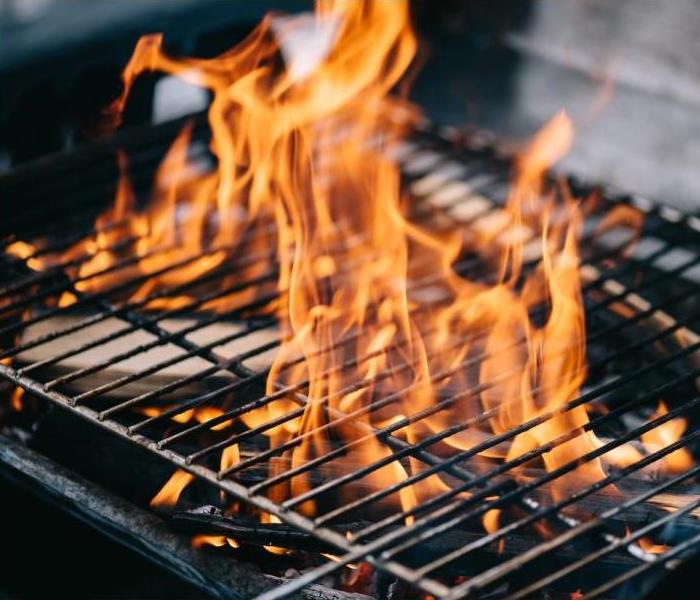 SERVPRO of W. Vancouver / Clark Co. Professionals wish you a safe and happy summer!
SERVPRO of W. Vancouver / Clark Co. Professionals wish you a safe and happy summer!
Celebrate Summer Safety
Summer is a time to enjoy the great outdoors, but it is also important to keep safety in mind. Consider the following tips, provided by the National Fire Protection Association, to keep you and your family safe all summer long.
- When using a charcoal grill, only use starter fluids designed for barbecue grills; do not add fluid after coals have been lit.
- When using a gas grill, ensure the hose connection is tight; check hoses for leaks. Applying soapy water to the hoses will easily and safely reveal any leaks.
- When camping, always use a flame-retardant tent and set up camp far away from the campfire.
- Always build a campfire downwind from the tent area. Clear vegetation and dig a pit before building your fire. Extinguish the fire before going to sleep or leaving the campsite.
- Store liquid fire starter (not gasoline) away from your tent and campfire and only use dry kindling to freshen a campfire.
Recommended Firework Safety Tips
6/9/2022 (Permalink)
 SERVPRO of E. Vancouver / Clark Co. is here to help 24/7 365 days a year @ (360) 254-0049
SERVPRO of E. Vancouver / Clark Co. is here to help 24/7 365 days a year @ (360) 254-0049
With July 4th approaching soon this is a perfect time to review some of the basic tips for handling fireworks to prevent injury or damage to yours, or other's property. These tips are provided by The National Council On Firework Safety.
- Obey all local laws regarding the use of fireworks.
- Know your fireworks; read the cautionary labels and performance descriptions before igniting.
- A responsible adult SHOULD supervise all firework activities. Never give fireworks to children.
- Alcohol and fireworks do not mix. Save your alcohol for after the show.
- Wear safety glasses when shooting fireworks.
- Light one firework at a time and then quickly move away.
- Use fireworks OUTDOORS in a clear area; away from buildings and vehicles.
- Never relight a “dud” firework. Wait 20 minutes and then soak it in a bucket of water.
- Always have a bucket of water and charged water hose nearby.
- Never carry fireworks in your POCKET or shoot them into METAL or GLASS containers.
- Do not experiment with homemade fireworks.
- Dispose of spent fireworks by wetting them down and place in a metal trash can away from any building or combustible materials until the next day.
- FAA regulations PROHIBIT the possession and transportation of fireworks in your checked baggage or carry-on luggage.
- Report illegal explosives, like M-80s and quarter sticks, to the fire or police department.
And let’s not forget the safety of our pets!
- Don’t bring your pets to a fireworks display, even a small one.
- If fireworks are being used near your home, put your pet in a safe, interior room to avoid exposure to the sound.
- Make sure your pet has an identification tag, in case it runs off during a fireworks display.
- Never shoot fireworks of any kind (consumer fireworks, sparklers, fountains, etc.) near pets.
We wish you a happy and SAFE 4th of July, and we definitely hope that you will not be in need of a restoration company this year. In the event that you experience any kind of water, smoke, or fire damage to your home or office all of us here at SERVPRO of W. Vancouver / Clark Co. are here to help 24/7 365 days a year @ (360) 254-0049
What to Know After A Fire
3/18/2022 (Permalink)
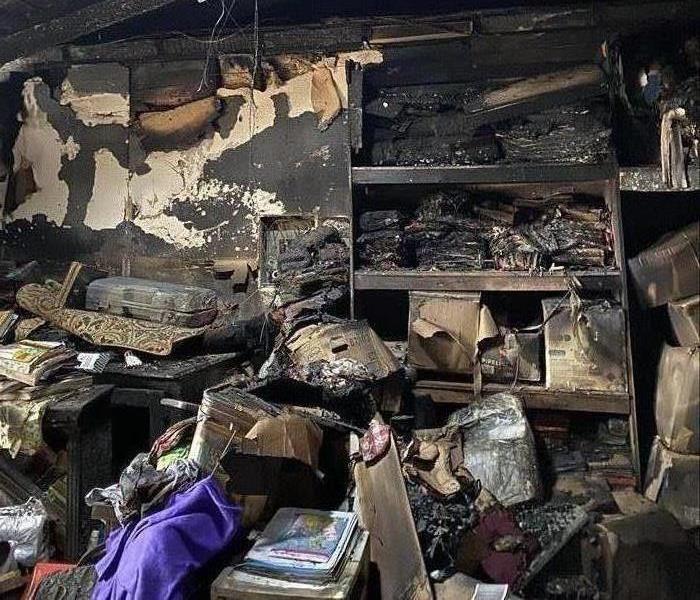 Our compassionate team is here to help answer any questions!
Our compassionate team is here to help answer any questions!
Fire damage in a home is often less of a problem than smoke damage. The reason is simple. The fire may be small, but smoke travels everywhere. Everything smoke touches needs cleaning. Luckily, dry-cleaning solves this problem for many fabrics. They include:
- Drapes and other window dressings
- Tapestries and Persian carpets
- Clothing that you would dry clean
- Any other exposed material which requires dry cleaning
Removal and Cleaning Applies to More Than Fabrics
The general rule after a fire is to remove everything from the home that’s not nailed down. Attempting to clean anything in place only makes the situation worse. All content cleaning should happen outside the home, but where? Dry-cleaning is only part of the answer. Others are:
- Electronics cleaners for home entertainment equipment, computers, and appliances
- Sonic cleaners for window blinds and other non-porous non-electric items
- Art restoration specialists for paintings, sculptures and other artistic pieces
- Laundry service for everything washable
Don’t Bring Anything Back to Your Smoke-Damaged Home
Your home is still suffering from the effects of the fire. Don’t return your newly-cleaned items only to have them contaminated again. If your things are ready to pick up, you need to solve the problem of content storage. Before you go out looking for storage, try the following:
- See if the cleaner will hold your items as a courtesy. Free storage is the best of all the alternatives. Be appreciative.
- The cleaner will hold your items for a storage charge. You are going to pay someone for storage. Why not pay someone who knows how to take care of your items?
- The cleaner will not hold your items. Ask for any recommendations on storage conditions or facilities. Perhaps the cleaner would be willing to package your items for safe storage.
If your home has a fire, you will want the services of fire remediation experts. They will deal with the smoke and other damage and get you and your mountain of dry-cleaning home quickly.
Furnace Maintenance: Avoiding a Home Fire
11/12/2021 (Permalink)
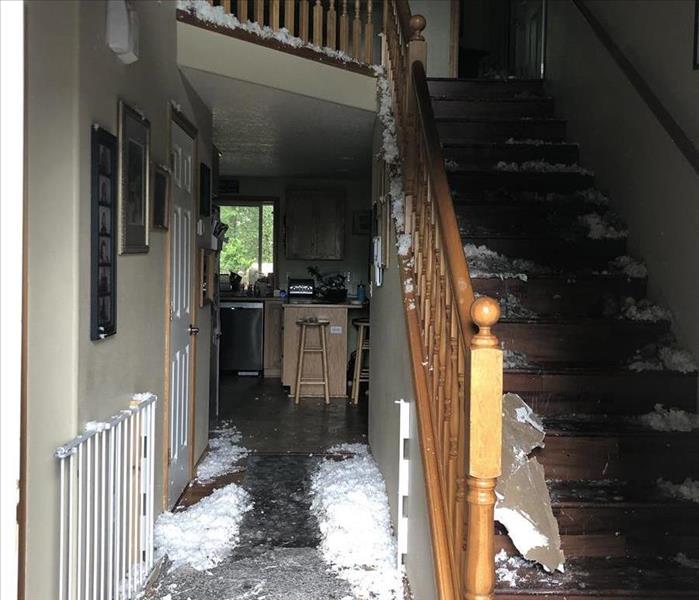 Our goal is to inform our followers to take necessary action before it's to late. You can avoid disaster with proper maintenance.
Our goal is to inform our followers to take necessary action before it's to late. You can avoid disaster with proper maintenance.
As a homeowner in Vancouver, WA, you have the worst-case scenario on your mind. After all, if a storm damages your roof or a fire burns your kitchen, you are the one who has to call in a restoration team to deal with the aftermath. Taking preventative measures can help you avoid smoke or fire cleaning. Even something like normal furnace maintenance can help make your house safer.
Make Sure It Works: The first thing regular maintenance does is ensure your furnace will work when you need it to. Going through the winter without a working heating device can leave you and your family stranded in a cold situation.
Reduce Buildup: Furnace filters help keep the air in your home clean. If these filters aren't cleaned regularly, the gunk in them could cause the furnace to overheat. An overheating furnace could lead to a fire. Regularly replacing your furnace filter can actually reduce the need for fire cleaning.
Fix Faults: As furnaces age, they may accumulate faults. Faulty wires and poor shut-off mechanisms can make your home more dangerous. Faulty wires can easily cause sparks that lead to smoky fires and the need for a major smoke cleaning in your house.
Contain Gas: If your unit uses gas to heat the home, you have to worry about the gas filling your house. However, proper maintenance looks at the gas lines to ensure everything is hooked up properly. When you have this inspection done annually, it's easy for you to be aware of a potential problem.
Protect Fuses: Some older furnaces may cause a circuit in your house to trip. If you have a professional look at the equipment regularly, you will know when it is no longer functioning on the electrical system.
If you don't want to hire a professional to perform smoke or fire cleaning, you need to do what you can to prevent a fire from breaking out in your house. Regular furnace maintenance is one thing you should always do to keep your home safe.
Three Non-Salvageable Items After a Fire
6/14/2021 (Permalink)
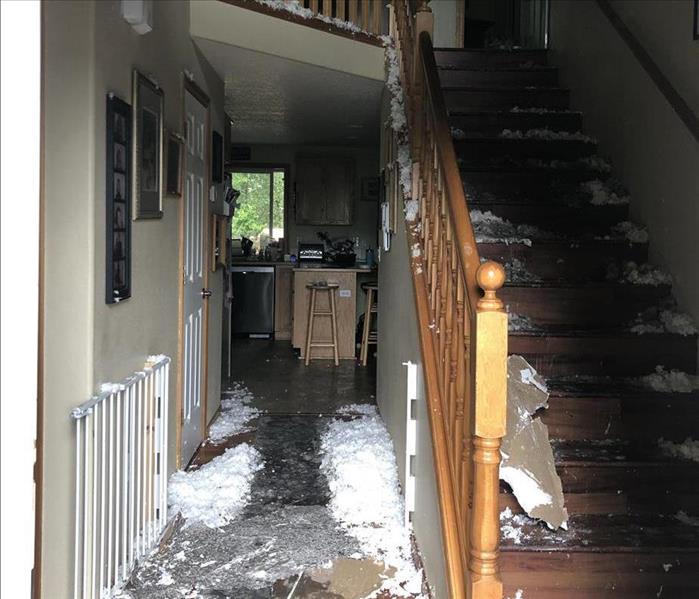 Give us a call for services or consultation, we're happy to help! (360) 695-4418
Give us a call for services or consultation, we're happy to help! (360) 695-4418
When a fire affects your Vancouver, WA, home, you may be left wondering how to restore your valued belongings and what to throw away. While circumstances vary, there are a few possessions that may need to be tossed to ensure the safety of your family. As you work to return your home to normal, there are several common household items you should consider replacing once they have endured a fire.
1. Medicine
The effectiveness of some medicines may be impacted once they have been exposed to high heat. When you can re-enter your home safely, check your medicine cabinet or other areas where you store prescription medications. If the plastic bottles appear warped or have been exposed to fire extinguisher dust, they should be thrown away. Ask your pharmacy about replacement options and whether you can be compensated for lost meds.
2. Cosmetics
When some cosmetics suffer fire damage, they may no longer be safe to apply to your skin. Any cosmetics left out on vanities or dressers in rooms affected by fire should be disposed of, as they might be coated with soot or ash that is difficult to see. It’s better to err on the side of caution, even if you take a loss on what you spent for your makeup.
3. Canned Foods
While you may be able to sanitize canned foods after a flood, fire and extreme temperatures can change the contents in ways that water cannot. Inspect your pantry’s contents carefully and throw away cans, dried goods and packages that have been visibly burned, appear warped or are coated with dried extinguisher foam.
Items inside your home can be affected by fire in different ways. Knowing what to throw away after a blaze can protect your family from the possible contaminants that may be lurking in everyday items. For more information, visit our website.
Preparing Your Home for Wildfire Season
6/7/2021 (Permalink)
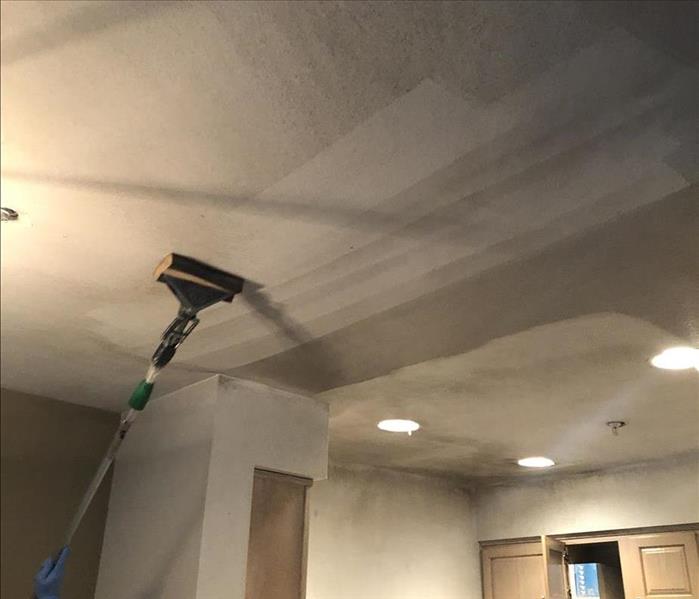 We can never predict what wildfire season will bring us. Call (360) 254-0049 for smoke or fire damage restoration.
We can never predict what wildfire season will bring us. Call (360) 254-0049 for smoke or fire damage restoration.
Are you prepared if your home is at risk because of a wildfire? With many wildfires surrounding the Pacific Northwest last summer here are some helpful tips to reduce damage and prepare your residence.
Maintain Defensible Space (0–5 feet)
Use noncombustible materials such as gravel, brick, or concrete in this critical area adjacent to your home.
Reduce Siding Risks
Maintain 6-inch ground-to-siding clearance, and consider noncombustible siding.
Clean Debris from Roof
Regularly remove debris from your roof, since debris can be ignited by wind-blown embers.
Use a Class A Roof Covering
Class A fire-rated roofing products offer the best protection for homes.
Clean Out Gutters Regularly
Keep debris out of gutters since debris can be ignited by wind-blown embers. If used, gutter covers should be noncombustible.
Reduce Fence Risks
Burning fencing can generate embers and cause direct flame contact to your home. Use noncombustible fences and gates.
Keep Embers out of Eaves and Vents
Use 1/8-inch mesh to cover vents, and box-in open eaves to create a soffited eave.
Protect Windows
Use multi-pane, tempered glass windows, and close them when a wildfire threatens.
Reduce Deck Risks
At a minimum, use deck boards that comply with California requirements for new construction in wildfire-prone areas, remove combustibles under deck, and maintain effective defensible space.
Maintain Defensible Space (5–30 feet)
Remove shrubs under trees, prune branches that overhang your roof, thin trees, and remove dead vegetation. Move trailers/RVs and storage sheds from area, or build defensible space around these items.
The information found in this article was provided by the Insurance Institute for Business and Home Safety.
Firework Safety in Clark County
6/2/2021 (Permalink)
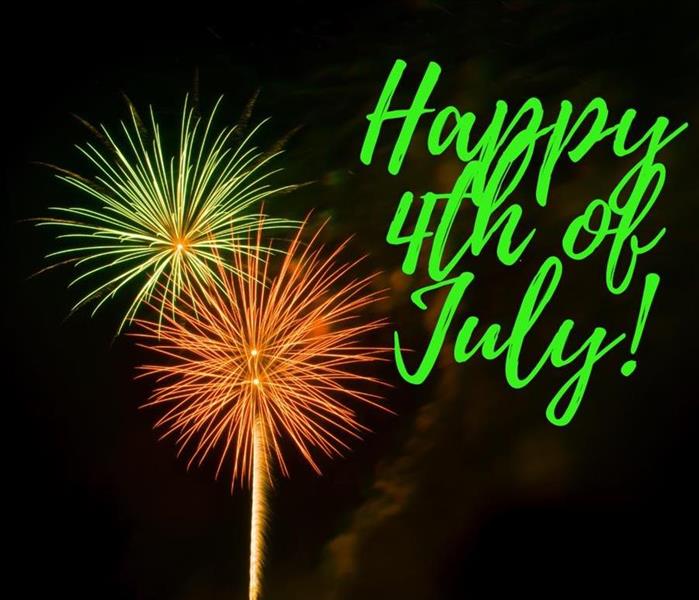 Enjoy your 4th of July safely!
Enjoy your 4th of July safely!
With July 4th approaching soon this is a perfect time to review some of the basic tips for handling fireworks to prevent injury or damage to yours, or other's property. These tips are provided by The National Council On Firework Safety.
- Obey all local laws regarding the use of fireworks.
- Know your fireworks; read the cautionary labels and performance descriptions before igniting.
- A responsible adult SHOULD supervise all firework activities. Never give fireworks to children.
- Alcohol and fireworks do not mix. Save your alcohol for after the show.
- Wear safety glasses when shooting fireworks.
- Light one firework at a time and then quickly move away.
- Use fireworks OUTDOORS in a clear area; away from buildings and vehicles.
- Never relight a “dud” firework. Wait 20 minutes and then soak it in a bucket of water.
- Always have a bucket of water and charged water hose nearby.
- Never carry fireworks in your POCKET or shoot them into METAL or GLASS containers.
- Do not experiment with homemade fireworks.
- Dispose of spent fireworks by wetting them down and place in a metal trash can away from any building or combustible materials until the next day.
- FAA regulations PROHIBIT the possession and transportation of fireworks in your checked baggage or carry-on luggage.
- Report illegal explosives, like M-80s and quarter sticks, to the fire or police department.
And let’s not forget the safety of our pets!
- Don’t bring your pets to a fireworks display, even a small one.
- If fireworks are being used near your home, put your pet in a safe, interior room to avoid exposure to the sound.
- Make sure your pet has an identification tag, in case it runs off during a fireworks display.
- Never shoot fireworks of any kind (consumer fireworks, sparklers, fountains, etc.) near pets.
We wish you a happy and SAFE 4th of July, and we definitely hope that you will not be in need of a restoration company this year. In the event that you experience any kind of water, smoke, or fire damage to your home or office all of us here at SERVPRO of W. Vancouver / Clark Co. are here to help 24/7 365 days a year @ (360) 695-1148
When Fire and Water Damage Collide
3/22/2021 (Permalink)
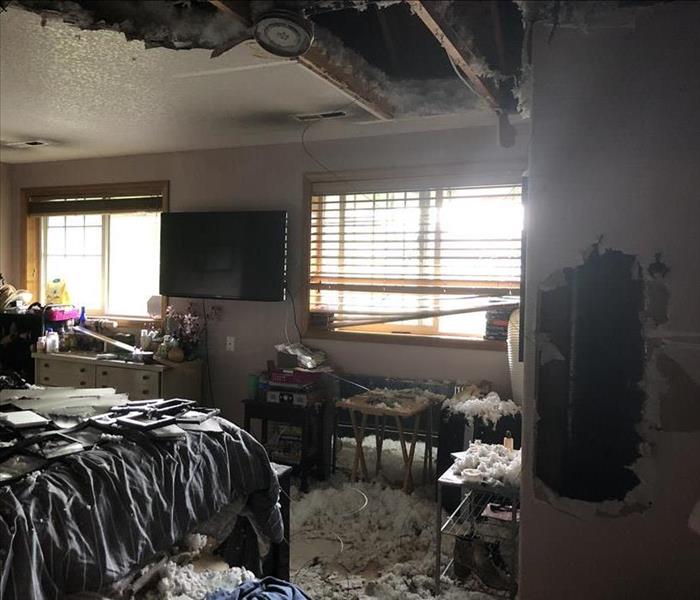 Our dedicated team is available 24/7. Home devastation doesn't follow a 9-5pm schedule and neither do we.
Our dedicated team is available 24/7. Home devastation doesn't follow a 9-5pm schedule and neither do we.
You may be surprised to learn that some of the most frustrating fire damage has to do with water. After the flames are gone and the smoke has settled, you are likely to have plenty of water damage to deal with. As you consider the odors, the soot, the damaged furnishings, burned structures, and soaking rooms, the whole situation can seem insurmountable. A clear solution to this problem is hiring restoration professionals.
First Steps After A Fire
The first few hours after the fire are the most important. As soon as you can, contact your insurance company. During this call, you can find out what your policy covers, and you may get recommendations concerning water and fire damage professionals in Battle Ground, WA. When you have the go-ahead from the fire department, collect important documents, memorabilia, and any necessary items that haven't been too impacted by the fire. If a member of the fire restoration team is present, have them look over your belongings to make sure you won’t bring smoke into your temporary living arrangements.
Involve Professionals in the Recovery
You should contact your local SERVPRO of West Vancouver/ Clark County (360) 254-0049. Our team of professionals know which inspections must be completed and can make sure that repairs are completed in compliance with local and national regulations. They also have specialized training and equipment to deal with both damages from the fire, water, and smoke.
As you put plans into place for recovering from fire damage, don't forget to make plans for water damage as well. Take time to choose a company that understands the potential for all types of damage after a fire.
After a Fire, Wait Until Help Arrives
2/8/2021 (Permalink)
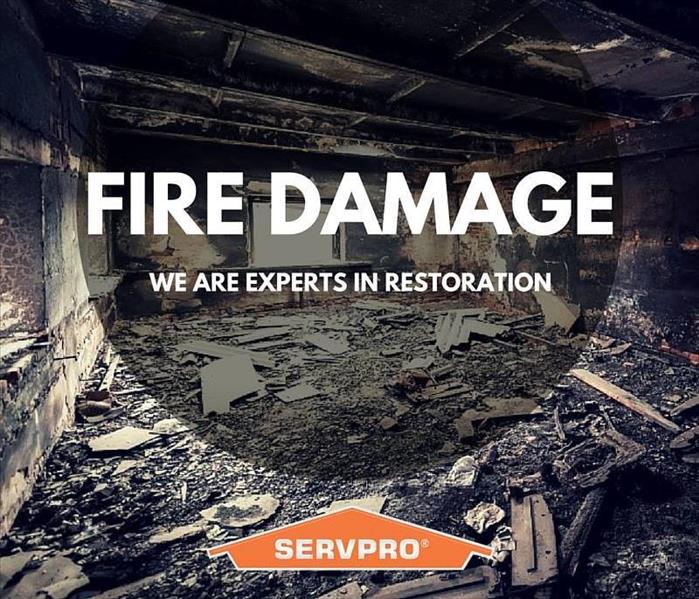 https://www.SERVPROwvancouverclarkco.com/fire-smoke-damage-restoration
https://www.SERVPROwvancouverclarkco.com/fire-smoke-damage-restoration
After experiencing fire damage to the home, it’s understandable if most homeowners want to clean it up themselves. However, homeowners run the risk of further damaging your home if not cleaned properly. When in doubt, call SERVPRO of Vancouver/ Clark County.
Until we arrive, keep these things in mind
- Limit movement in the home as much as possible to prevent further damage.
- Place clean towels or linens on carpeted areas to prevent more soiling.
- Always keep your hands clean to avoid spreading soot around the home.
- Do not attempt to wash walls or painted surfaces.
- Do not attempt to shampoo carpet or other surfaces.
- Do not attempt to clean electrical appliances.
SERVPRO of Vancouver/ Clark County understands how much your home means to you. Our 24 hour, 7 days a week availability allows us to respond quickly. Our team of experts make fire damage “Like it never even happened.” Call us today at (360) 254-0049
How to Classify a Fire
11/13/2020 (Permalink)
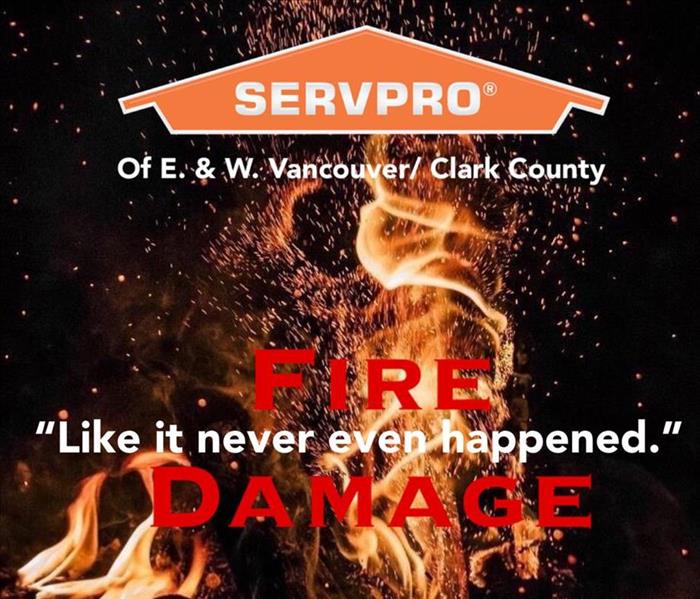 Here to help through your fire damage. Just call (360) 254-0049
Here to help through your fire damage. Just call (360) 254-0049
Fire Damage Classifications
Removal of property from a home or business depends on the type of damage sustained to the structure and personal items. Our team is trained to determine whether the cause was the heat and flames, smoke residues, or as a result of the effects to extinguish the fire. Each type of damage will also fall into three levels or categories of damage: Minor, Medium, and Major.
With Minor Damage
- There is little need for removal.
- The fire was restricted to a single room, quickly extinguished and small.
- Only small items like dish towels and perhaps the pot or pan where the fire started must be disposed of and replaced.
- Most of the restoration involves light cleaning of residue covered ceilings, walls, floors, counters and cabinets.
With Medium Damage
- More property is removed.
- The fire was larger, spread into other parts of the home, and took longer to extinguish.
- Larger items such as furniture and drywall panels are physically damaged and require disposal.
- The cleaning method requires stronger chemicals and tools like scrub brushes.
- Odors are very noticeable and require further cleaning to eliminate them.
With Major Damage
- Items near the origin of the fire are severely burnt and need immediate removal and disposal.
- Structural components such as framing also suffer physical damage.
- Smoke residues are so thick that some items may need to be cleaned using ultrasonic equipment or may not be able to be completely cleaned and require replacement.
- Odors may be so strong that eliminating them can be more expensive than the option of replacement.
- Removal of contents does not necessarily mean they must be disposed. We can move salvageable items or those that simply need cleaning to either an on-site storage container on their property or to storage at our facility while repairs are being completed.
We’re always here to help. Our goal is to address your restoration needs as professionally and quickly as possible. The sooner you contact us, the sooner we can get your property and life back to "Like it never even happened."
What to do after a Fire
7/31/2020 (Permalink)
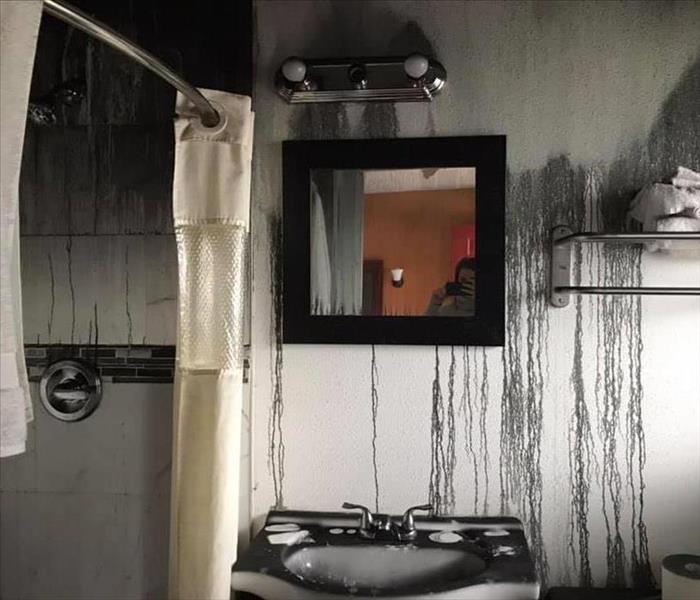 SERVPRO of Vancouver/Clark County is available 24-hours a day, 365 days a year to help you regain control quickly. Give us a call at (360) 254-0049
SERVPRO of Vancouver/Clark County is available 24-hours a day, 365 days a year to help you regain control quickly. Give us a call at (360) 254-0049
The first 48 hours after a fire damage can make the difference between restoring versus replacing your property and personal belongings. SERVPRO of Vancouver/Clark County provides timely response with mitigation services ranging from fire, smoke and soot removal to contents claims inventory. These services help ensure your property, belongings and memories are restored to preloss condition when possible.
What You Can Do Until Help Arrives
- Limit movement in the home to prevent soot particles from spreading and additional damage from occurring.
- Place clean towels or old linens on rugs and high traffic areas and upholstery.
- Coat chrome faucets, trim and appliances with petroleum jelly or oil.
- Place aluminum foil or wood blocks between furniture legs and wet carpet.
- Do not wash any walls or painted surfaces.
- Do not shampoo carpet or upholstery.
- Do not clean any electrical equipment.
- Do not send clothing to a dry cleaner since improper cleaning may set smoke odor.
Why Board Up After a Fire?
6/19/2020 (Permalink)
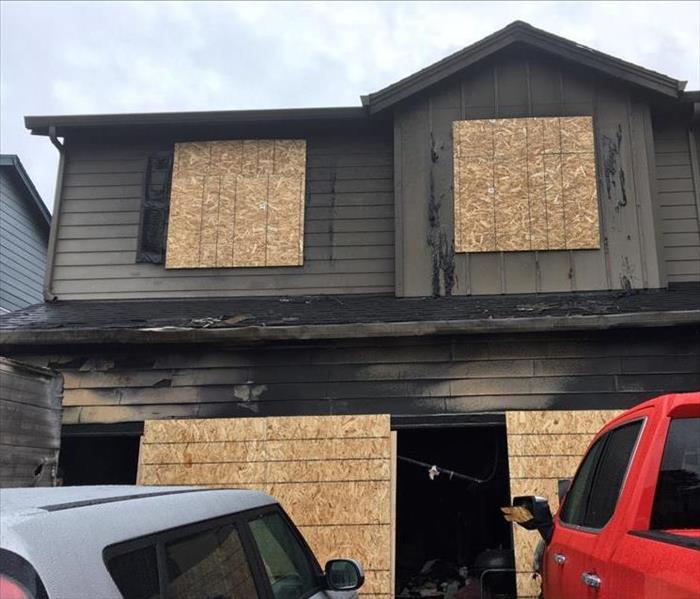 To secure your home or business after any devastating damage, call your neighbors at SERVPRO (360) 254-0049
To secure your home or business after any devastating damage, call your neighbors at SERVPRO (360) 254-0049
If your commercial property in Clark County has experienced a fire, there are several reasons why you might want to board up structural damage or windows. In addition to keeping the external elements out of your home with fire damage, boarding up can also prevent additional losses due to looting and make the fire cleanup process easier.
Boarding Up
Most full-service restoration specialists offer boarding-up services. Here are four reasons to board-up after a fire.
1. The premises still have sustainable inventory. If the building still contains products that appear viable, you should consider boarding. These products may involve evaluation and cleaning and may not be suitable for sale, but it may be useful for insurance reasons to have them correctly processed rather than stolen.
2. You want electronics and other valuables to be protected. You may be able to restore certain electronics or other precious assets to working condition depending on the extent of the fire damage. Loss can be much more costly than repairing or replacing covered.
3. You need to keep out the elements. If the structure of your property has sustained extensive damage, you should try to keep the elements out. Exposure to additional water, wind, or sunlight can compound the damage caused by smoke residue and soot.
4. You want to limit soot damage. It is generally a good idea to reduce foot traffic on the scene of a recent fire. When soot gets embedded into carpeting or upholstery, it can be much more difficult to restore these materials to a pre-fire condition.
Talk to restoration experts at SERVPRO of Vancouver/ Clark County, about whether boarding-up is a good strategy for preventing loss and limiting the damage after a fire. Your major concern is likely to be how to recover from fire damage as quickly and completely as possible. Preventing looting and exposure to the elements can make fire cleanup more successful.
Fire Damage Restoration Process
6/3/2020 (Permalink)
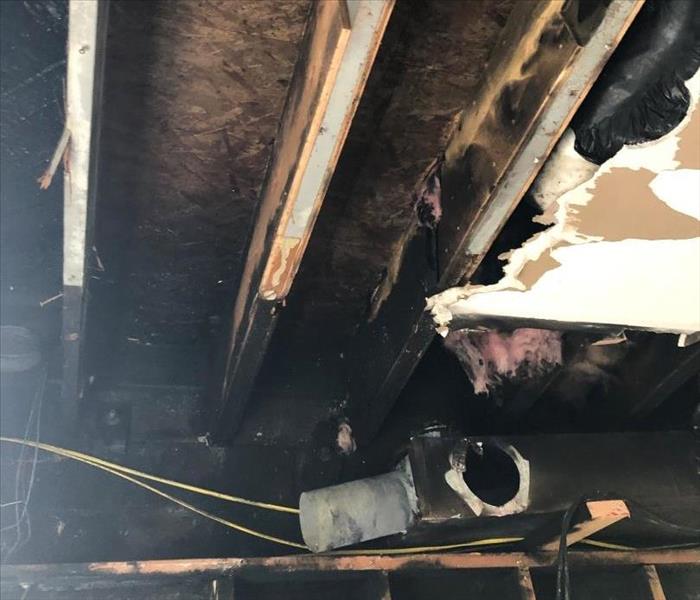 If a fire has affected your home, give us a call at (360)254-0049.
If a fire has affected your home, give us a call at (360)254-0049.
Fire Damage and Restoration
It is hard to imagine anything more severe than a fire in your home that threatens your family’s sense of security and leaves behind plenty of fire damage. A fire can quickly bring a business' operations to a halt suddenly, affecting not only the business but its customers as well. A fire that is out of control can wreak major havoc on communities.
Every sixty-five seconds a structure fire is reported, according to the National Fire Protection Association. When the alarm goes off, fire departments plus emergency responders will answer the call for help with action that is decisive and fast. When the smoke clears, SERVPRO’s fire restoration team will stand ready to help with the same kind of quick response, any time of day or night.
The golden hours of recovery are within the first day or two after fire damage has occurred. An effective emergency response will quickly stabilize your structure and make sure to recover as much of your property as is possible. The smoke and acidic soot damage which is many times produced when fires are extinguished will accelerate the corrosion and deterioration of the components of the building and its vital assets. To make matters worse, fires are most often extinguished with water or dry chemicals. The toxic smoke odor left behind must also be neutralized and deodorized.
The process of fire damage restoration will include mitigating damage, cleaning up smoke damage and water restoration as fast as possible once the damage has occurred. Besides the visual damage to the structure, the contents inside the structure have to be looked at for recovery based upon several factors which include:
- Cost of replacement vs. cost of restoration
- Effect of heat and smoke
- Loss of value
- Loss of use
- Lowered life expectancy
- Sentimental value
SERVPRO’s fire restoration services may include demolition, emergency board up, thermal deodorization to mitigate damage from smoke and total reconstruction.
Commercial Fire Damage? What Now?
3/25/2020 (Permalink)
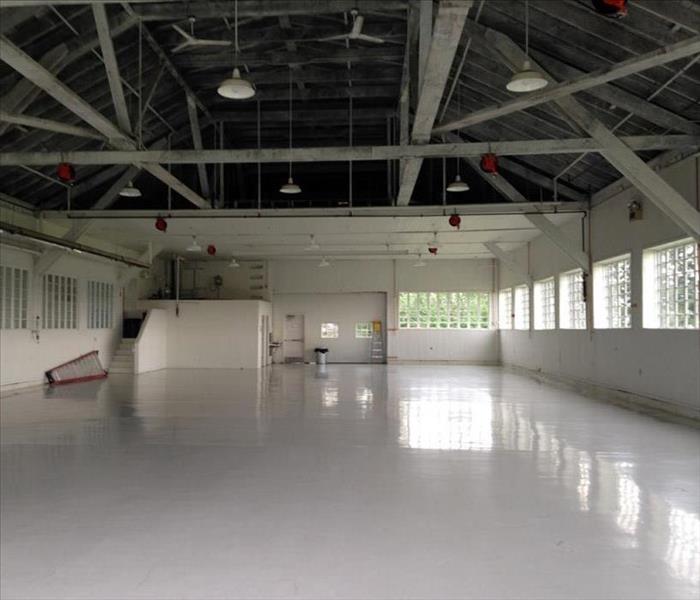 To learn more about the SERVPRO Sparkle like in this photo, call us today at (360) 254-0049
To learn more about the SERVPRO Sparkle like in this photo, call us today at (360) 254-0049
The challenges involved in dealing with commercial fire damage, require the assistance of a professional like SERVPRO of Vancouver. We’re here to help you get back on your feet no matter how severe the damage!
What Types of Damage Can You Expect?
When you think of fire damage, what comes to mind is typically the more obvious devastation but it’s the soot and smoke that requires a set of trained eyes for proper removal. This can damage fragile items such as textiles or artwork, also invading nooks and crevices you can’t see but certainly smell. Then there’s the water and fire suppressant foam that’s used to control fires. While it’s definitely vital for extinguishing flames, it can also cause added damage to your business.
What Repairs Must Be Done?
What does it take to get your business back on its feet after a fire? First, the structure has to be examined and determined to still be solid. If the damage was extensive, you may need to hire a general contractor and in extreme cases, a demolition crew.
If that’s not the case, though, call your local fire professionals at SERVPRO of Vancouver to begin the cleaning process. We have a restore rather than replace Then the repairs and cleaning process begins. Here are is list of some services that may be performed:
- Removal of effected materials
- Deodorize structure and contents
- Eradicate mold if present.
Types of Smoke
2/10/2020 (Permalink)
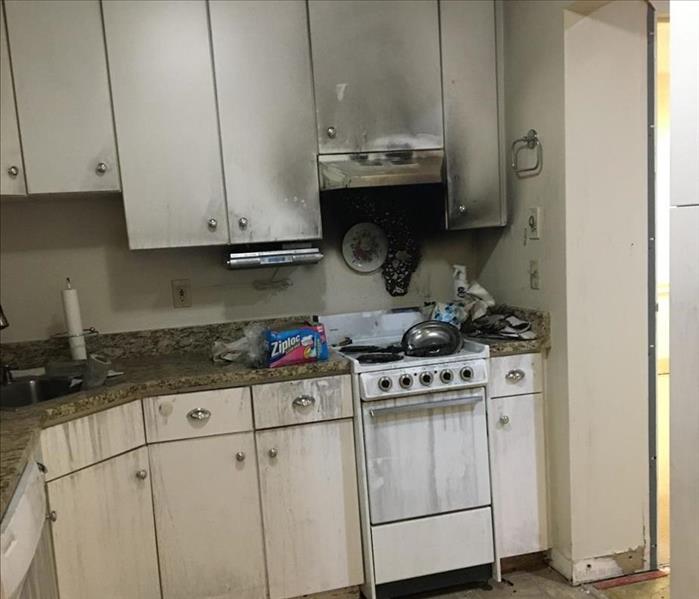 Every SERVPRO professional is dedicated to restoring both the property and the lives of the customers being helped.
Every SERVPRO professional is dedicated to restoring both the property and the lives of the customers being helped.
After a fire, aside from the the more obvious damage to your home or business there is another silent factor; smoke. Depending on the type of smoke, it may greatly affect the restoration process. SERVPRO technicians are thoroughly trained in fire cleanup and restoration and know the different types of smoke which is vital to proper restoration.
Wet Smoke (Plastic & Rubber)
Low heat, smoldering, pungent odor, sticky, smeary. Smoke webs are more difficult to clean.
Dry Smoke (Paper & Wood)
Fast-burning, high temperatures; heat rises, therefore smoke rises.
Protein Fire Residue (Produced by evaporation of material rather than from a fire)
Virtually invisible, discolors paints and varnishes, extreme pungent odor.
Fuel Oil Soot (Furnace Puff Backs)
While "puff backs" can create havoc for homeowners SERVPRO technicians can, in most cases, restore the contents and structure quickly.
Other Types (Tear gas, fingerprint powder, and fire extinguisher residue)
Special loss situations require special care.
If your home or business suffers fire or smoke damage, contact SERRVPRO of West Vancouver/ Clark County, we are trained to handle even the toughest losses here to help make it “Like it never even happened.”
Kitchen Caution
11/19/2019 (Permalink)
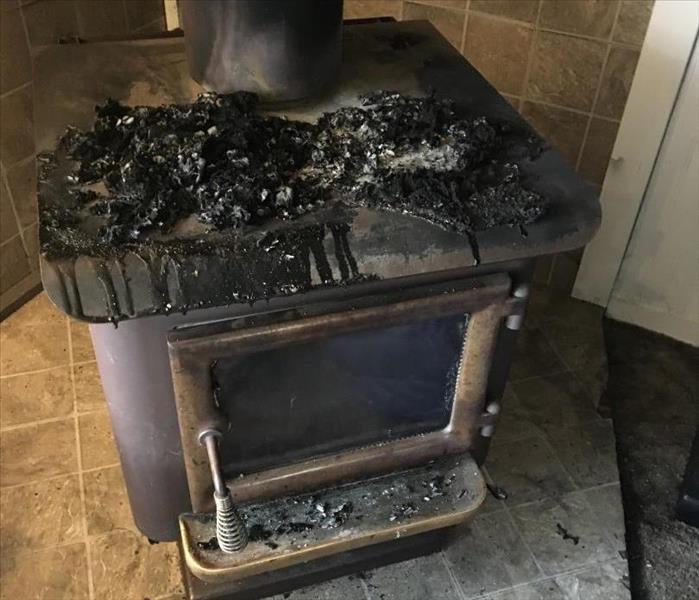 Items were left unattended on this wood stove causing smoke and soot to cover every surface in this residence.
Items were left unattended on this wood stove causing smoke and soot to cover every surface in this residence.
Each November, families gather to celebrate Thanksgiving by preparing a delicious meal, but if you don’t practice safe cooking habits, your holiday could become hazardous very quickly. According to the national fire protection Association, cooking fires are the number one cause of home fires and home injuries. The leading cause of fires in the kitchen is unattended cooking. It’s important to be alert to prevent cooking fires.
-Be on alert! If you are sleepy or have consumed alcohol don’t use the stove or stove top.
-Stay in the kitchen while you are frying, grilling, boiling, or broiling food.
-If you are simmering, baking, or roasting food, check it regularly, remain in the kitchen while food is cooking, and use a timer to remind you that you are cooking.
-Keep anything that can catch fire (oven mitts, wooden utensils, food packaging, towels, or curtains) away from the stove top.
If you have a cooking fire, consider the following safety protocols to help keep you and your family safe.
-Just get out! When you leave, close the door behind you to help contain the fire.
-Call 9-1-1 or the local emergency number after you leave.
-For an oven fire, turn off the heat and keep the door closed.
-If you try to fight the fire, be sure others are getting out and you have a clear way out.
-Keep a lid nearby when you’re cooking to smother small grease fires. Smother the fire by sliding the lid over the pan and turn off the stove top. Leave the pan covered until it is completely cooled.
SERVPRO Vancouver/ Clark County wish you a safe and happy holiday season!
We Can Help Prevent Puffbacks In Your Vancouver Home
8/19/2019 (Permalink)
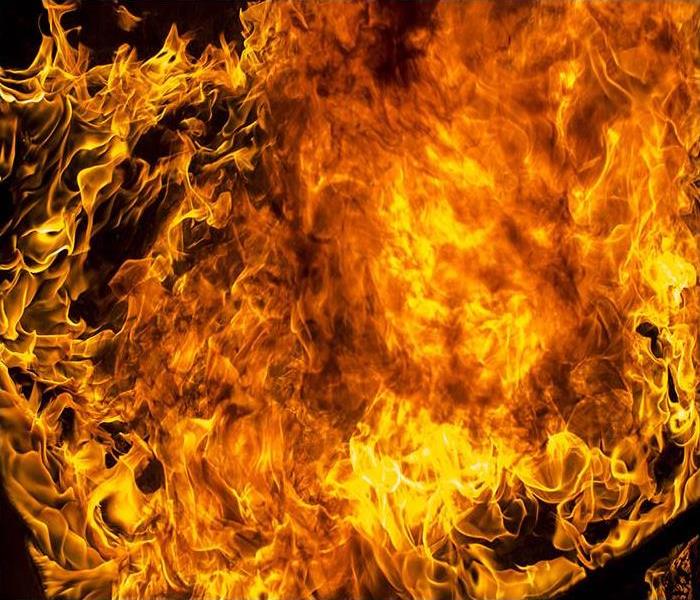 Let our SERVPRO of W. Vancouver / Clark Co. professionals show you how we can make it “Like it never even happened.”
Let our SERVPRO of W. Vancouver / Clark Co. professionals show you how we can make it “Like it never even happened.”
Cleaning The Furnace In Your Vancouver Home To Prevent Puffbacks
With winter always feeling perpetually around the corner for parts of Washington, it is vital to take the necessary steps to protect your Vancouver home from entirely preventable circumstances. Through the harshest winter months, your home’s furnace sees excessive use attempting to regulate and maintain a constant, comfortable temperature. Especially in oil-based furnaces, lack of proper maintenance can lead to an alarming situation: puff backs. This phenomenon sends soot and carcinogens throughout your ductwork, attaching to registers, vents, and the corners of affected rooms.
An excellent way to identify this need for fire cleanup in Vancouver homes is by looking along the ceiling of your property for black groupings that look like spider webs. The misfiring of your furnace results from a buildup of vapor in the ignition chamber of the furnace which powerfully combusts when the system does eventually ignite. The explosion sends debris, soot, and other particulates throughout your system at an alarming pace, allowing it to circulate through areas even far from the incident. Our SERVPRO professionals can help.
There are two primary focuses that a homeowner should have when faced with these circumstances, to clean out the system and to efficiently remove the soot damage throughout the property. To accomplish the first, you have to get the furnace system serviced. You have to get the ignition chamber cleared of any further threats and work to make the other elements of the system more efficient to prevent this buildup from occurring again. To reduce the risk of recurrences, this maintenance and inspection should happen annually.
Removing the soot is something that many homeowners mistakenly believe that they can address on their own, but this can be more of a hurdle than many realize. Soot becomes easily smeared, which can mar surfaces and materials to the point of requiring replacement, or a fresh coat of paint. All of these added steps take time and require more out of pocket expense from the customer to accomplish. Instead, you can trust in the many approaches our SERVPRO team has for removing soot in your house, including HEPA vacuums and chemical sponges.
Furnace puff backs are a common problem with oil furnaces throughout the area, but a fast reaction on your part can protect your home and its contents from staining soot damage. Let our SERVPRO of W. Vancouver / Clark Co. professionals show you how we can make it “Like it never even happened.” by calling (360) 695-4418.
For more about Vancouver click here.
How Does SERVPRO Clean Fire Damage from Vancouver Walls and Ceilings?
8/7/2019 (Permalink)
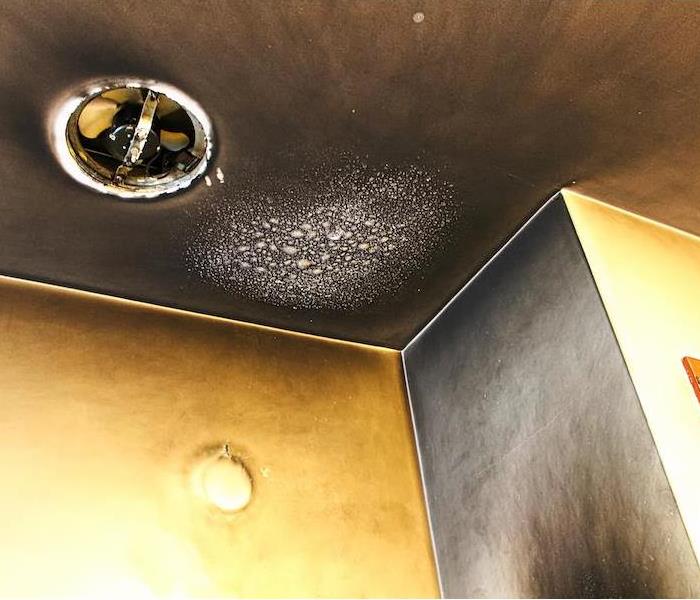 SERVPRO has the training and cleaning methods to restore your home after fire damage.
SERVPRO has the training and cleaning methods to restore your home after fire damage.
Types of Cleaning After Fire Damage in Your Home
After fire damage occurs in a home, it is not automatically a given that the walls and ceilings require repainting. Depending on several factors, including the amount of smoke damage and blistering of the paint from the high heat, the walls and ceilings may very well have restoration potential through our proprietary cleaning applications.
When SERVPRO arrives onsite to restore fire damage in a Vancouver home, we work hard to ensure there is minimal loss of possessions and building materials. We have access to specialized equipment and the training as taught by the approved methodology through The Institute of Inspection, Cleaning, and Restoration Certification. On a case by case basis, this training enables us to lessen the loss homeowners experience after a fire.
As we clean the fire loss areas in the home, we inspect the walls and ceilings and ascertain the cleaning necessary through both visuals as well as testing the residue. We utilize three main methods for cleaning these areas in the home:
- Dry Cleaning-this type of cleaning works best for powdery residue left behind by the burning of wood or paper. We use dry cleaning sponges to pick it up and remove it.
- Wet Cleaning-a sponge wet with the application of our professional-quality cleaning solutions assists with the lifting off of heavy, greasy residues. Our technicians use this approach most often to clean walls, ceilings, metal, or wood.
- Peroxide Active Cleaning-this is a cleaning method developed by SERVPRO to clean acoustical ceilings and porous surfaces without harming the exterior coating.
When we clean walls and ceilings, SERVPRO designates them as "cleaning for paint" or "no paint." The latter designation means after cleaning, the surface does not require painting. As a fire burns, the hot air expands and drives soot into heated paint, in cases like this, the areas probably need repainting. When "cleaning for paint," our technicians take into consideration during mitigation that we are also preparing the surface for repainting as part of the restoration services.
SERVPRO of W. Vancouver / Clark Co. at (360) 695-4418 is available 24/7 to help local property owners limit their loss from fire damage through our exclusive methods and equipment. Our goal is to restore every home to its preloss condition and make the damage to your home "Like it never even happened."
Vancouver, WA
SERVPRO's Pack-Out Services Allow Flexibility for Restoring Fire Damaged Possessions in Vancouver
6/25/2019 (Permalink)
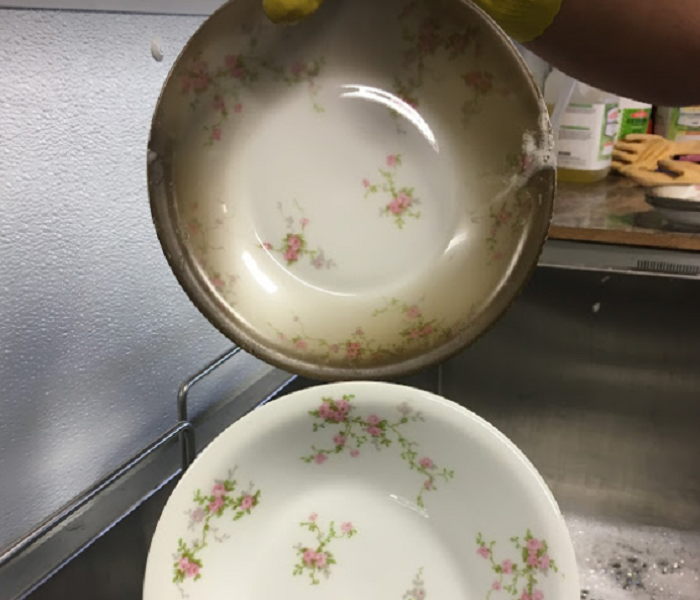 Our Pack-Out services allow us to safely and securely move your possessions to our facilities for storage and cleaning.
Our Pack-Out services allow us to safely and securely move your possessions to our facilities for storage and cleaning.
Protect Your Possessions with a Pack-Out after a Vancouver Home Fire
The mess and chaos homeowners view after firefighters leave their Vancouver home cause feelings of despair and helplessness. Charred, wet, and soot-covered walls, floors, and ceilings are hard to imagine cleaned and repaired, ready to welcome you and loved ones. Perhaps the most heartbreaking is the apparent loss of household goods, furnishings, and personal possessions that made your house a home. Our team can help remediate both structures and contents of your home post-fire.
Specially-trained technicians can help preserve the lifetime of memories contained inside your fire damaged Vancouver home. Moving articles from your house to our production facility gives you a wealth of cleaning, drying, and remediation options much more difficult to implement if they remain on-site at your home. We are happy to explain how we manage a fire damage pack-out and recommend it in many cases to speed the work at your house while at the same time giving your treasures the attention they need.
SERVPRO uses the Contents Claim Inventory System (CCIS) to ensure we document the description of every item removed from your fire-damaged home. We use modern techniques like digital photography and barcoding to create the inventory, but also employ traditional strategies like lists for each room cleared when indicated and practical. Throughout the process, we work with your insurance carrier to provide documentation crucial to the payment of claims.
SERVPRO Fire and Smoke Restoration Technicians (FSRT) can proceed more efficiently within cleared spaces at your home, removing water and soot and assessing charring and other damage without the need to continuously move furniture and other items around. Meanwhile, you can rely on our Contents Processing Technicians (CPT) to take exceptional care when cleaning, drying, deodorizing, and remediating everything from your furniture to intricate heirloom china and precious metals to papers and books to your children’s toys and beloved stuffed animals.
Our resources include industrial washers, dryers, immersion, and ultrasonic cleaning tubs, access to freeze-drying services, and many other strategies our Institute of Inspection, Cleaning, and Reconstruction Certification (IICRC)-trained production technicians know to work well. We take pride in the results and understand how important returning your possessions to function and appearance is to your peace of mind.
SERVPRO of W. Vancouver / Clark Co. responds to your fire damage scenario with professionalism and compassion. Call (360) 695-4418 round the clock to partner with our multi-talented and IICRC certified team.
More about Vancouver.
Don’t Stress About Fire Damage Remediation in Your Vancouver Residence
6/14/2019 (Permalink)
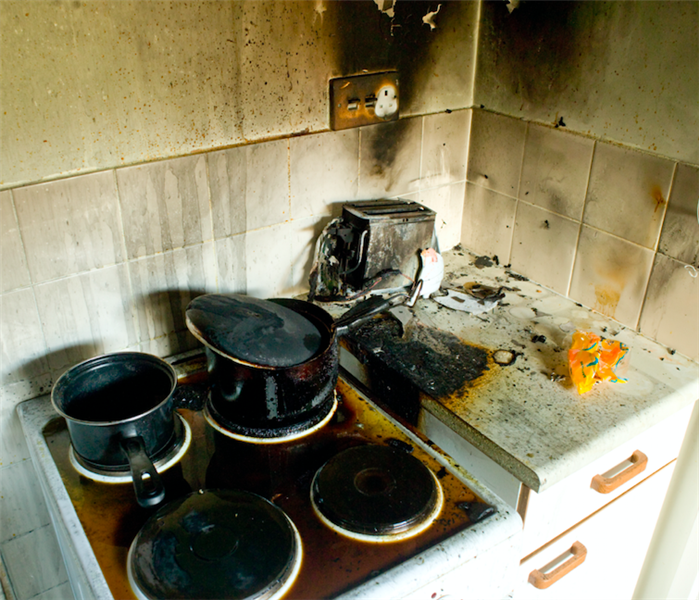 Fire damage remediation is not an easy job to handle alone. Contact the professionals at SERVPRO today for remediation assistance.
Fire damage remediation is not an easy job to handle alone. Contact the professionals at SERVPRO today for remediation assistance.
Effective Tools for Cleaning Soot Damage in Vancouver Homes
Cleaning up after a fire loss incident can often be much more challenging than many Vancouver residents might care to believe. With many of the effects spreading far from the ignition point throughout the property, it is easy for homeowners to become overwhelmed with even the initial damage assessment and debris removal. Beyond these initial tasks, our professionals must also tackle spreading effects like foul odors and soot damages.
Soot is a common effect after a fire damage incident occurs in any Vancouver home. While the thickness and severity of the residue can vary based on the materials that get burned during a loss incident, overcoming these effects often requires the same approach from our trained SERVPRO fire restoration specialists. We have advanced equipment that can quickly handle damaging conditions like soot and smoke residues, including green cleaners, chemical sponges, and high-powered vacuums.
As with many of the hurdles that a homeowner faces after a fire loss incident, addressing soot damage requires specific steps happening in a particular order. Our SERVPRO team begins with the use of high-powered portable vacuums. These units have a strong suction to pull loose debris and the bulk of settled carcinogens and other debris from the surface of materials and contents throughout the property.
Chemical sponges can either get used wet or dry on surfaces and materials. In many cases, an individual sponge is good for a single use in a property, cleaning an average of 50 sq. feet before needing to get discarded. These special products can cut down to the surface of the affected material or item in your house, removing any staining and remaining buildup. Cleaning agents with scrubbers and sponges can get used for removing any lingering soot and begins to address strong odors.
We understand the importance of a fast reaction when soot effects spread throughout your property. The longer that these conditions persist, the worse they can become. Let our SERVPRO of W. Vancouver / Clark Co. professionals show you advanced equipment to make it “Like it never even happened.” Give us a call anytime at (360) 695-4418.
Click here for more information about the city of Vancouver.
3 Things You May Need To Throw Away After a Home Fire
2/5/2019 (Permalink)
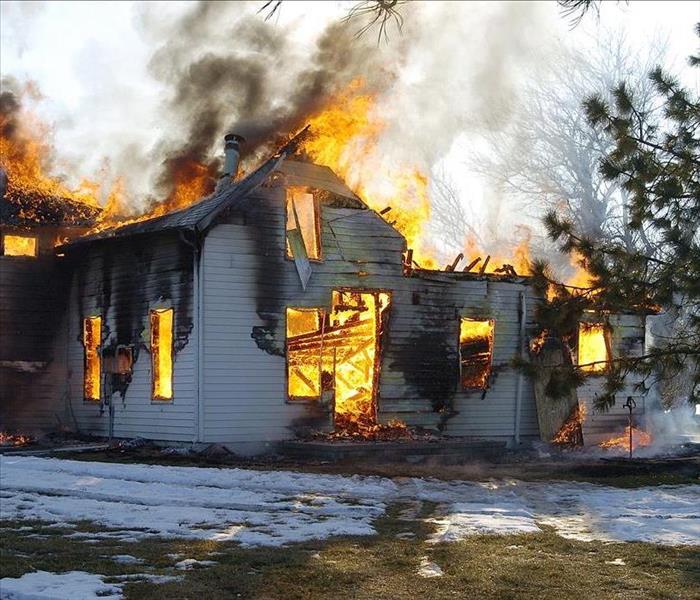 Fire in a Salmon Creek, WA home
Fire in a Salmon Creek, WA home
Items that Need to Be Thrown Out After a Fire
When a fire occurs in your home in Salmon Creek, WA, the process of cleaning up can be daunting. Often, people are unsure of what to throw away. There are several types of items that are often damaged in fires, and they commonly need to be thrown out.
1. Cosmetics
Cosmetics, even if they are packaged, generally need to be stored in clean, cool environments to remain in good condition. Unfortunately, high heat from a fire can cause the packaging of many items, and the items themselves, to melt. As a result, smoke and soot can easily damage the cosmetics, making them unsafe to use.
2. Food
After a fire, it’s often best to throw away the majority of food items in your home. Though some items may be visibly damaged, especially if the fire occurred in the kitchen, some pieces of food may appear to be unharmed. However, even if items are canned or wrapped up, smoke and soot can still affect the quality of food, and consuming food that has been harmed by soot or smoke damage can be hazardous. If you’re unsure whether or not food has been harmed, it’s generally best to discard the item.
3. Medication
Many medications need to be stored in relatively cool environments, and some medications may need to be stored in a refrigerator. During a fire, the temperature in a house can quickly rise. The high heat from a fire can damage the overall quality of the medication, which can ultimately make the medication ineffective and unsafe to consume. If you can document the medications that need to be replaced, you may be able to receive compensation from your insurance company.
Knowing that you may need to throw away cosmetics, food, and medication after a fire can help make the process of sorting through your belongings easier. Often, homeowners whose homes have sustained damage from fires find it useful to work with fire damage restoration experts.
Best Ways To Remove Smoke Odor From Your Home
12/24/2018 (Permalink)
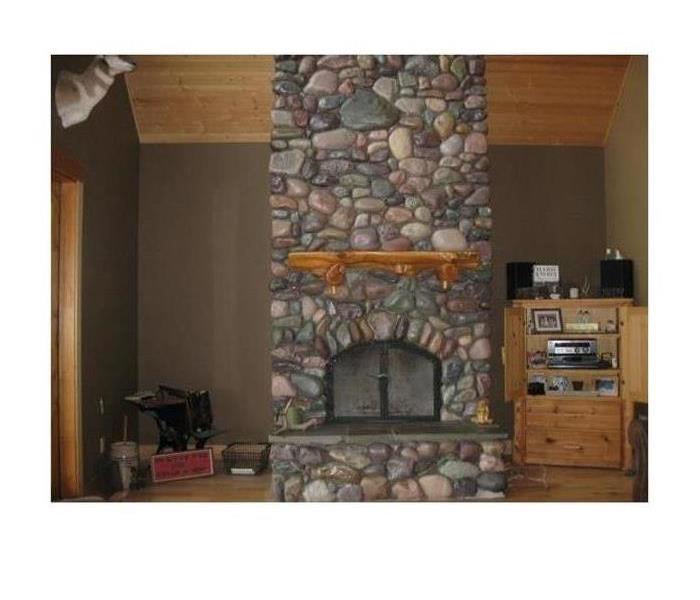 If you have smoke damage in your Hazel Dell, WA home get in contact with a professional cleaning company
If you have smoke damage in your Hazel Dell, WA home get in contact with a professional cleaning company
A lot can go wrong if a fire starts in your Hazel Dell, WA, home. At the very least, you will deal with inconvenience and hassle. No matter how large or small the fire may be, you’ll probably encounter the need for smoke cleaning. The nasty odor smoke leaves behind can overwhelm anyone and make it difficult to remain in your house. Fortunately, there are some effective methods the professionals use that can help get rid of this nuisance.
Whom Should You Call?
Cleaning up after smoke damage isn’t an ordeal you should tackle alone. There are some outstanding professional cleanup companies that boast the expertise to get your home back in shape. Here are some reasons why trained professionals are your best source of help:
- They have years of experience cleaning up after residential fires.
- They have the right equipment and techniques to thoroughly remove traces of smoke.
- They work quickly and efficiently.
- They have excellent customer service.
Air Filtration Devices
One of the most common ways a professional will help restore your home and rid it of smoke odor is by using air filtration devices. An experienced company will use heavy-duty equipment to remove toxins and other harmful materials from the air in your home. This will give you peace of mind that you can once again breathe clean air and not worry about illness or other health concerns.
Ozone Machines
In small doses, ozone is effective in removing the particles in smoke that cause odor. Only a professional should administer this form of smoke cleaning, as it can be toxic in large amounts. Ozone breaks down the bacteria and other materials so they will no longer smell.
Thermal Foggers
Another way to eliminate unappealing smoke odor is through a thermal fogger. This method is best used in conjunction with other steps such as the use of baking soda. The fogger takes in a deodorizing solution and then blows it out into the affected area.
When you need deep smoke cleaning, get in touch with the pros. A reliable technician will use these steps to help remove terrible odors from your house.
Proactive Wild Land Fire Information
9/27/2018 (Permalink)
Even though our local home town may not be at immediate risk of wild land fires, we do live in a region of strong possibilities.
In the teachings of the American Red Cross, wild land fires are the number one most likely disaster concern in our territory. Wild land fires can easily reach structures if in the path of the fire line.
The best way to counter act that possibility is to prepare your surroundings and heed the warnings of the local media. Be aware of the different types of warnings.
Take a moment to read and follow the advice below.
- Clear leaves and other debris from gutters, eaves, porches and decks. This prevents embers from igniting your home.
- Remove dead vegetation and other items from under your deck or porch, and within 10 feet of the house. Learn more about the basics of defensible space on the Firewise website.
If any type of fire disaster has affected your life, home or business, please call us.
SERVPRO of W. Vancouver/Clark Co. 360-254-0049
More tips on how to avoid a wildfire.
9/27/2018 (Permalink)
Part 2 of keeping your home safe during the wildfire season.
- Screen or box-in areas below patios and decks with wire mesh to prevent debris and combustible materials from accumulating.
- Remove flammable materials (firewood stacks, propane tanks) within 30 feet of your house, deck or porch.
- Wildfire can spread to tree tops. Prune trees so the lowest branches are 6 to 10 feet from the ground.
- Keep your lawn hydrated and maintained. If it is brown, cut it down to reduce fire intensity. Dry grass and shrubs are fuel for wildfire.
- Don't let debris and lawn cuttings linger. Dispose of these items quickly to reduce fuel for for fire.
- Inspect shingles or roof tiles. Replace those that are loose or missing to prevent ember penetration.
- Cover exterior attic vents with metal wire mesh no longer than 1/8 inch to prevent sparks from entering the home.
- Enclose under-eave and soffit vents or screens with metal mesh to prevent ember entry.
Remember to give us a call if your home or business is covered in smoke or soot after a wildfire.
SERVPRO of W. Vancouver/Clark Co. 360-254-0049
Fixing Your Roof After Fire Damage: Three Helpful Tips
8/19/2018 (Permalink)
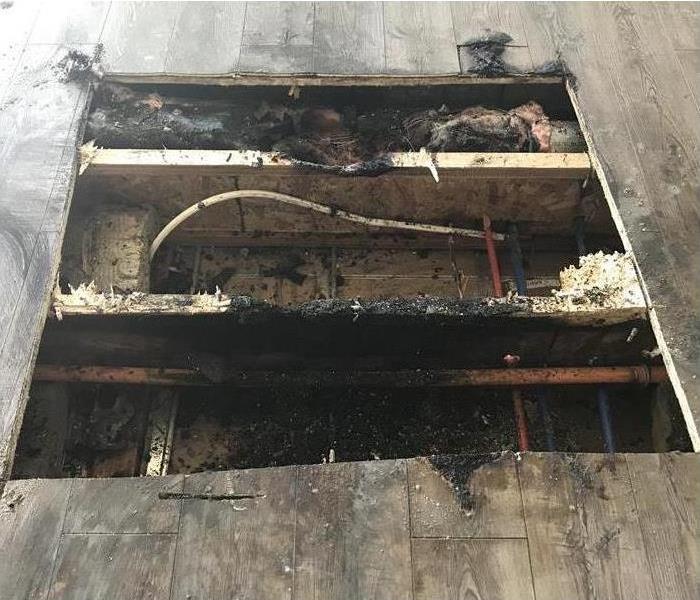 Electrical fire damage in a Ridgefield, WA home
Electrical fire damage in a Ridgefield, WA home
If your Ridgefield, WA, business has recently suffered damage from a fire, there’s a good chance that your roof was affected. Approaching your roof repair in the best way is a crucial step in the fire cleanup process. Here are three tips that you can take to make the process easier on yourself.
1. Take Advantage of Tarp Services
Placing a temporary tarp on your roof is an excellent way to help keep the elements out of your property after a commercial fire. Take advantage of tarp services from fire damage companies who can install a high-quality tarp for you while you make repair plans.
2. Stay Away If the Building Is Unsafe
This may not seem like a typical repair tip, but you will be of no use in the fire cleanup process if you are injured by hazards present in a building that has not been cleared for reentry by the fire department. In some cases, flames can even build back up at the sight of a former fire. If you are not supposed to be on the property, stay away until the coast is clear.
3. Research Repair Companies
Make sure that the company making roof repairs knows what they are doing. Fire damage can range from holes cut by firefighters to help them during the fire process to destruction caused by the smoke and flames. In some cases a fire restoration company may be able to fix the damage, as well.
Fire cleanup is going to be an emotional process for you, especially when you have to think about the ways that any fire damage is affecting your business. Having a plan in place and using your best judgment where safety and repair decisions are concerned are important in order to get your roof fixed as soon as possible and get your employees back to work.
Avoiding Fires While Grilling
7/24/2018 (Permalink)
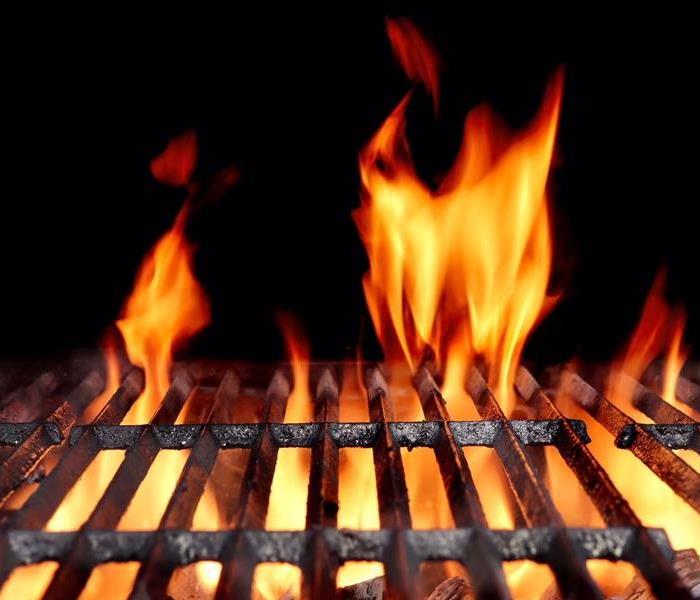 Cooking outdoors for friends and family is a special treat.
Cooking outdoors for friends and family is a special treat.
People in Vancouver, WA, and all over the country enjoy a good barbecue, and frankly, what’s not to love? Besides the traditional hamburgers, hot dogs, chicken, ribs and steak, veggies, fruits, and even pizza have found their way to flame cooking. By following some simple tips, you can stay safe and avoid the inconvenience of a grill fire.
Tips for Safe Charcoal Grilling
A bbq fire that gets out of control could cause damage to a home by engulfing flammable materials near the grill. In that case, there are professionals who stand ready to help with the remediation of bbq smoke damage to your home. However, grilling with charcoal or propane gas without drama is easy to do if you heed the following safety tips.
• All grills must be used only outdoors and be constantly attended.
• Place the grill away from the house, railings, or overhanging vegetation or structures.
• Keep children and pets away from hot grills.
• Grills must be kept clean; remove all fats and grease to avoid a grill fire.
• Neither charcoal lighter fluid nor matches should be kept near a grill in use.
• Wait until coals have completely cooled before disposing of them in a metal container.
Tips for Safe Gas Grilling
Inspecting the tank, hoses, connections and the grill itself for leaks should be routine. To check any of these areas for leaks, before grilling apply a light solution of soap and water to connections and check for bubbles. If bubbles are seen, tighten connections and recheck. If the bubbling persists, have the grill serviced by a professional. If a leak is detected while grilling, turn off the tank and burners. If the smell of gas persists, call the fire department without delay.
Cooking outdoors for friends and family is a special treat. Eliminating the risk of a grill fire will make your next barbecue safe and enjoyable. For more information, visit http://www.SERVPROwvancouverclarkco.com/.
Cooking Safely to Avoid Fire and Smoke Damage
6/29/2018 (Permalink)
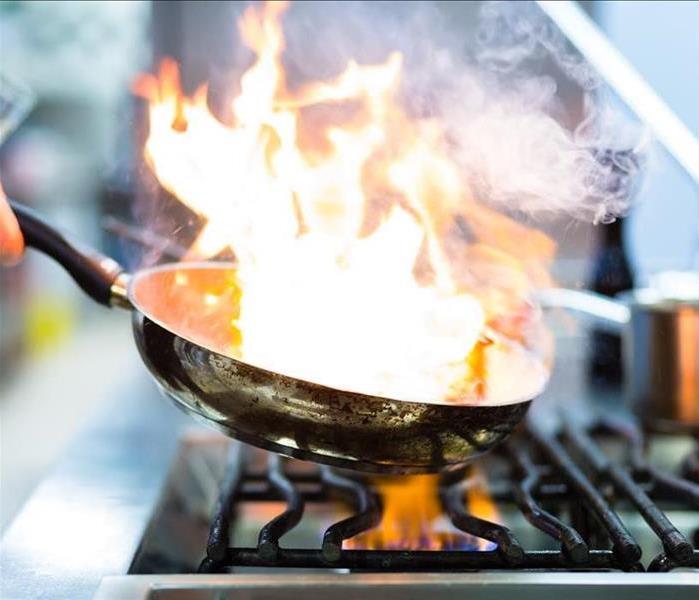 Cooking fires in Vancouver
Cooking fires in Vancouver
Cooking fires are the leading cause home fires and fire-related injuries in the US. Fire Departments respond to an estimated 156,600 home structure fires every year and 2 out of 5 cooking related.
More that $853 Million in property damages each year are fires as a result of cooking.
Thousand of cooking related fire injuries are reported every year. SERVPRO offers you these safety tips to ensure your safety and your homes safety.
- Don't ever wear loose clothing while cooking
- Never leave cooking food unattended
- Check food regularly and never leave the house
- Keep children away from the cooking area
- Keep any flammables far away from the cooking area
- Clean cooking area often to prevent grease buildup
- Purchase a Fire extinguisher and be properly trained
- Always check the kitchen before going to bed
- Make sure smoke alarms are installed on each level of the home and outside all sleeping areas.
3 Tips for Planning a Fire Escape Route for Your Home
5/10/2018 (Permalink)
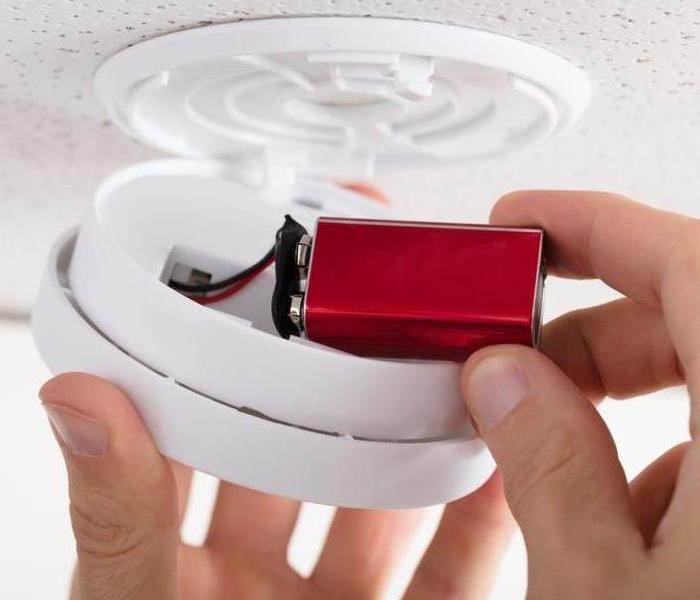 Creating a fire escape plan for your Vancouver, WA, home can protect your family from imminent danger in case the worst should happen.
Creating a fire escape plan for your Vancouver, WA, home can protect your family from imminent danger in case the worst should happen.
If a fire were to break out in your Vancouver, WA, home, getting yourself and your family to safety would probably be your top priority. Since fires can happen unexpectedly, having a pre-planned fire escape plan is a wise idea and may help every member of your family get out of the house quickly. If you are ready to create this type of safety plan, there are a few tips you can keep in mind to make it efficient, effective and simple.
1. Plan With the Family
Creating an emergency escape plan with your family present can ensure that everyone living in your home is prepared in case of a fire emergency. Gather everyone together when you have at least an hour to discuss a plan and allow everyone to contribute their ideas. When everyone is prepared and aware of the escape route, this can increase the chances of preventing a disaster if a fire breaks out.
2. Plan More Than One Route
According to the American Red Cross, you have about two minutes to escape your home once a fire starts. If the fire starts near where you have planned to exit or it spreads there, this can cause you to become trapped. To prevent this, you might want to add more than one egress to your fire escape plan. Consider both a front and back entrance escape, either a door or a window, that your family can use if the other is blocked by flames.
3. Have Your Home Inspected for Fire Hazards
While having an escape plan is wise, having your home professionally inspected for potential hazards can reduce the chances of you ever needing it. Have a fire damage and restoration company look over your home and ask their techs for advice about what you can do to make it less prone to fires.
Creating a fire escape plan for your Vancouver, WA, home can protect your family from imminent danger in case the worst should happen. Take time to create and test your plan to give yourself as much peace of mind as possible. For more information, visit http://www.SERVPROwvancouverclarkco.com/.
9 Smoke Odor Removal Musts
10/27/2017 (Permalink)
"I live in a crack house. Well, it used to be a crack house until the new owner threw out the old tenants and restored the home, to the relief of the neighborhood. But I’m afraid that it wasn’t completely restored. I’m a non-smoker, and on humid days the smell of cigarette smoke can be pretty pervasive in some rooms. I’m guessing a lot of it may come from the popcorn ceiling that was only painted over when it probably should have been removed. But on fire restoration jobs, this is a much bigger issue."
One of the most critical concerns for fire restoration contractors is failing to control or eradicate odors. This problem can lead to frustrated customers as well as potential legal and financial dangers. Eliminating this problem is made more difficult when remodeling work was undertaken by either inexperienced homeowners or unprofessional contractors, as their alterations may have contributed to hidden places for fire and smoke damage to linger.
Remediating a fire loss may also take longer, meaning you might have to wait a while before you’re paid. In fact, some contractors have avoided getting involved in fire restoration because it seems too complicated. But it’s not, as long as you appreciate the principles and correct techniques of fire restoration and odor control. Here are some things to remember:
- Make sure there’s a straightforward exchange of information between you, the customer, the insurance adjuster and any possible subcontractors. Communicating clearly and setting expectations is a critical component of the job.
- Get a written agreement from the homeowner on exactly what areas have been damaged by the fire and what items should be salvaged or discarded. You don’t want them coming back to you later claiming you’ve trashed an heirloom or didn’t finish the job.
- The way that fire and water damage jobs are handled do have some similarities, but they can’t be interchanged. Confirm that only techs with at least a Fire and Smoke Restoration Technician (FSRT) certification are allowed to work on the site. Being Odor Control Technician (OCT) certified is also helpful.
- Smoke and fire residues can be poisonous, as fires can include the demolition of plastic, foam, fabric, carpet, wood products, synthetic textiles, and asbestos-containing materials. Ash and smoke can also cause widespread corrosion, etching and staining, as well as persistent powerful odors. So removing these and their sources should be your first priority.
- If the damage is localized, contain those areas to assist in removing odors.
- Carefully inspect all areas that may have numerous layers of wall board. These may hide unexpected gaps and voids that turn into superhighways for circulating smoke and odor.
- Examine all wall cavities, duct work, and plumbing chases to establish whether they suffered any smoke residue or fire damage.
- Use a borescope to discover any damage that may otherwise have been impossible to see without having to completely remove a part of the structure. If the fire is recent, use of a thermal imaging camera may reveal hidden warmer areas, indicating possible fire damage.
- Aside from losing their valuables, the majority of homeowners are underinsured. They may even have to take up temporary lodging. So you’re going to be dealing with some very distraught people. Train yourself and your employees on how to be empathetic and ways to successfully communicate with them.
When eliminating malodors on fire jobs, remember that there are several factors that can impact the strength of the odor:
- Size - The bigger the fire, the more objects have burned, and thus there’s been more smoke.
- Length -The longer a structure has been exposed to smoke, the more deeply odor has seeped into porous materials.
- Space - When a fire occurs in a smaller room, the smoke odor becomes more intense and concentrated.
- Stuff - Not all odors are equal. For instance, burning wood, plastic and protein all have very different smells and consistency. This may influence the types of odor eliminators you use.
WHERE the damage occurred and WHAT burned will always be your two main concerns in fire restoration. Knowing the full answers to those questions will likely ensure that your restoration efforts will be complete and that you’ll be able to eliminate all of those irritating malodors, while at the same time eliminating any call backs.
Source: ODOROX
What To Do Before, During, and After A Fire
10/4/2017 (Permalink)
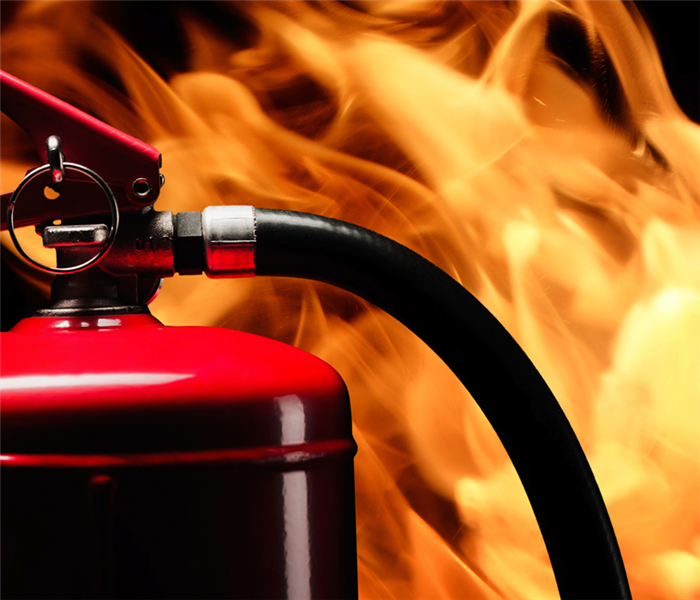 Contact your fire experts at SERVPRO of W. Vancouver / Clark Co. for further assistance in recovering from the fire @ (360) 695-4418
Contact your fire experts at SERVPRO of W. Vancouver / Clark Co. for further assistance in recovering from the fire @ (360) 695-4418
Before A Fire
- Install the right number of smoke alarms. Test them once a month and replace the batteries at least once a year.
- Teach children what smoke alarms sound like and what to do when they hear one.
- Ensure that all household members know two ways to escape from every room of your home and know the family meeting spot outside of your home.
- Establish a family emergency communications plan and ensure that all household members know who to contact if they cannot find one another.
- Practice escaping from your home at least twice a year. Press the smoke alarm test button or yell “Fire“ to alert everyone that they must get out.
- Make sure everyone knows how to call 9-1-1.
- Teach household members to STOP, DROP and ROLL if their clothes should catch on fire.
If A Fire Starts
- Know how to safely operate a fire extinguisher
- Remember to GET OUT, STAY OUT and CALL 9-1-1 or your local emergency phone number.
- Yell "Fire!" several times and go outside right away. If you live in a building with elevators, use the stairs. Leave all your things where they are and save yourself.
- If closed doors or handles are warm or smoke blocks your primary escape route, use your second way out. Never open doors that are warm to the touch.
- If you must escape through smoke, get low and go under the smoke to your exit. Close doors behind you.
- If smoke, heat or flames block your exit routes, stay in the room with doors closed. Place a wet towel under the door and call the fire department or 9-1-1. Open a window and wave a brightly colored cloth or flashlight to signal for help.
- Once you are outside, go to your meeting place and then send one person to call the fire department. If you cannot get to your meeting place, follow your family emergency communication plan.
Recovering After A Fire
- Call 9-1-1. Give first aid where needed; cool and cover burns to reduce the chance of further injury or infection.
- Let friends and family know you’re safe.
- People and animals that are seriously injured or burned should be transported to professional medical or veterinary help immediately.
- Stay out of fire-damaged homes until local fire authorities say it is safe to re-enter.
- Contact your fire restoration and cleanup experts at SERVPRO of W. Vancouver / Clark Co. for further assistance in recovering from the fire @ (360) 695-4418.
Source: American Red Cross - National Sponsor of SERVPRO
Smoke Detectors Save Lives
9/25/2017 (Permalink)
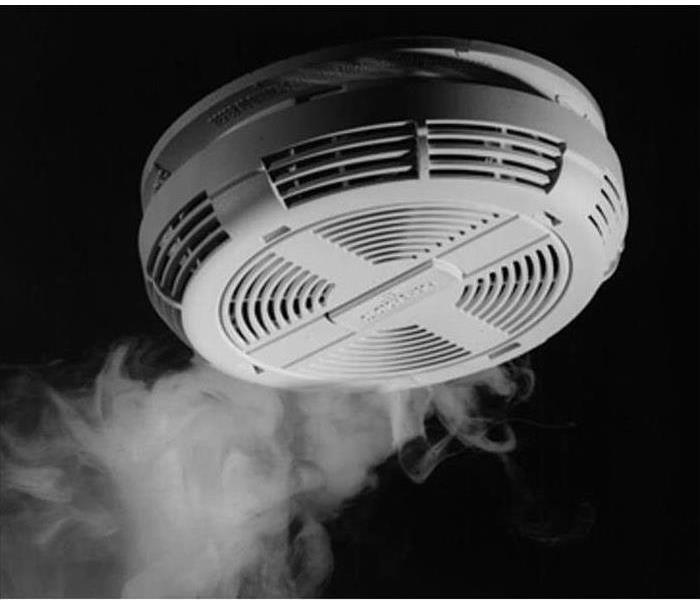 Smoke Detectors Save Lives
Smoke Detectors Save Lives
- Three out of Five fire deaths occur in homes with no smoke alarms or when the alarms are not working.
- Smoke alarm failures usually result from missing, disconnected, or dead batteries.
- More than one-third(37%) of home fire deaths result from fires in which no smoke alarms are present
- The risk of dying in a house fire is cut in half in homes with working smoke alarms.
- Install smoke alarms at every level of the home along with every bedroom.
- Be sure to test smoke alarms at least once a month using the test button.
- Replace batteries in smoke alarms at least once a year. If an alarm "chirps", the battery is low and should be replaced right away.
- Replace smoke alarms every 10 years with brand new smoke alarms.
- Information provided curtosity of The American Red Cross
Protect Your Home From Wildfire
9/1/2017 (Permalink)
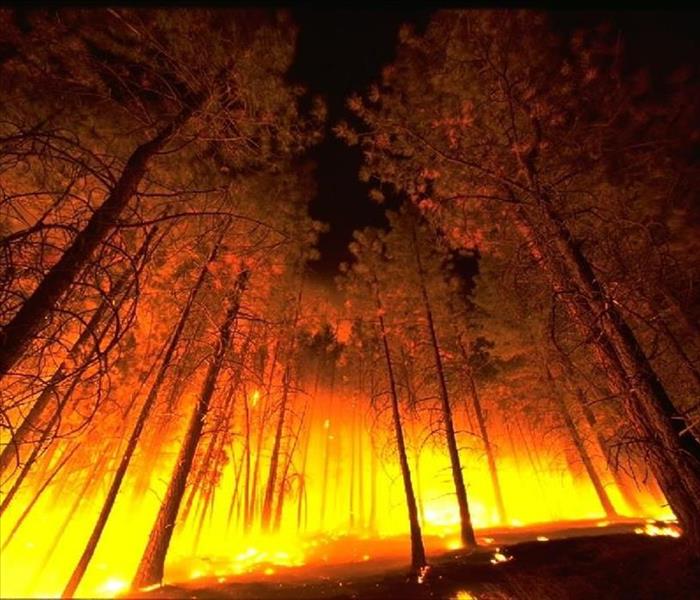 If your home or business is affected by smoke or fire damage call your local experts at SERVPRO of W. Vancouver & Clark Co. (360) 695-4418
If your home or business is affected by smoke or fire damage call your local experts at SERVPRO of W. Vancouver & Clark Co. (360) 695-4418
Are you prepared if your home is at risk because of a wildfire? With many wildfires surrounding the Pacific Northwest this summer here are some helpful tips to reduce damage to your residence.
1. Maintain Defensible Space (0–5 feet)
Use noncombustible materials such as gravel, brick, or concrete in this critical area adjacent to your home.
2. Reduce Siding Risks
Maintain 6-inch ground-to-siding clearance, and consider noncombustible siding.
3. Clean Debris from Roof
Regularly remove debris from your roof, since debris can be ignited by wind-blown embers.
4. Use a Class A Roof Covering
Class A fire-rated roofing products offer the best protection for homes.
5. Clean Out Gutters Regularly
Keep debris out of gutters since debris can be ignited by wind-blown embers. If used, gutter covers should be noncombustible.
6. Reduce Fence Risks
Burning fencing can generate embers and cause direct flame contact to your home. Use noncombustible fences and gates.
7. Keep Embers out of Eaves and Vents
Use 1/8-inch mesh to cover vents, and box-in open eaves to create a soffited eave.
8. Protect Windows
Use multi-pane, tempered glass windows, and close them when a wildfire threatens.
9. Reduce Deck Risks
At a minimum, use deck boards that comply with California requirements for new construction in wildfire-prone areas, remove combustibles under deck, and maintain effective defensible space.
10. Maintain Defensible Space (5–30 feet)
Remove shrubs under trees, prune branches that overhang your roof, thin trees, and remove dead vegetation. Move trailers/RVs and storage sheds from area, or build defensible space around these items.
The information found in this article was provided by the Insurance Institute for Business and Home Safety.
Recommended Firework Safety Tips
7/3/2017 (Permalink)
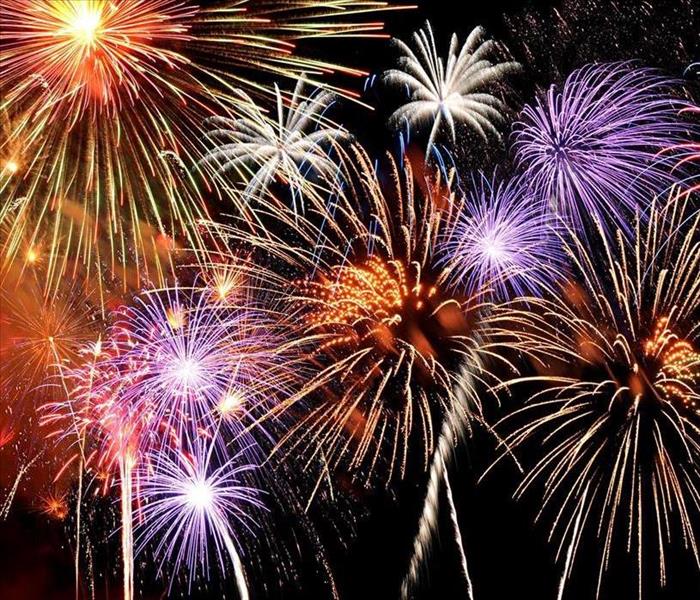 SERVPRO of W. Vancouver / Clark Co. is here to help 24/7 365 days a year @ (360) 695-4418
SERVPRO of W. Vancouver / Clark Co. is here to help 24/7 365 days a year @ (360) 695-4418
With July 4th approaching soon this is a perfect time to review some of the basic tips for handling fireworks to prevent injury or damage to yours, or other's property. These tips are provided by The National Council On Firework Safety.
- Obey all local laws regarding the use of fireworks.
- Know your fireworks; read the cautionary labels and performance descriptions before igniting.
- A responsible adult SHOULD supervise all firework activities. Never give fireworks to children.
- Alcohol and fireworks do not mix. Save your alcohol for after the show.
- Wear safety glasses when shooting fireworks.
- Light one firework at a time and then quickly move away.
- Use fireworks OUTDOORS in a clear area; away from buildings and vehicles.
- Never relight a “dud” firework. Wait 20 minutes and then soak it in a bucket of water.
- Always have a bucket of water and charged water hose nearby.
- Never carry fireworks in your POCKET or shoot them into METAL or GLASS containers.
- Do not experiment with homemade fireworks.
- Dispose of spent fireworks by wetting them down and place in a metal trash can away from any building or combustible materials until the next day.
- FAA regulations PROHIBIT the possession and transportation of fireworks in your checked baggage or carry-on luggage.
- Report illegal explosives, like M-80s and quarter sticks, to the fire or police department.
And let’s not forget the safety of our pets!
- Don’t bring your pets to a fireworks display, even a small one.
- If fireworks are being used near your home, put your pet in a safe, interior room to avoid exposure to the sound.
- Make sure your pet has an identification tag, in case it runs off during a fireworks display.
- Never shoot fireworks of any kind (consumer fireworks, sparklers, fountains, etc.) near pets.
We wish you a happy and SAFE 4th of July, and we definitely hope that you will not be in need of a restoration company this year. In the event that you experience any kind of water, smoke, or fire damage to your home or office all of us here at SERVPRO of W. Vancouver / Clark Co. are here to help 24/7 365 days a year @ (360) 695-4418
Why Hire SERVPRO For Smoke & Fire Damage?
6/26/2017 (Permalink)
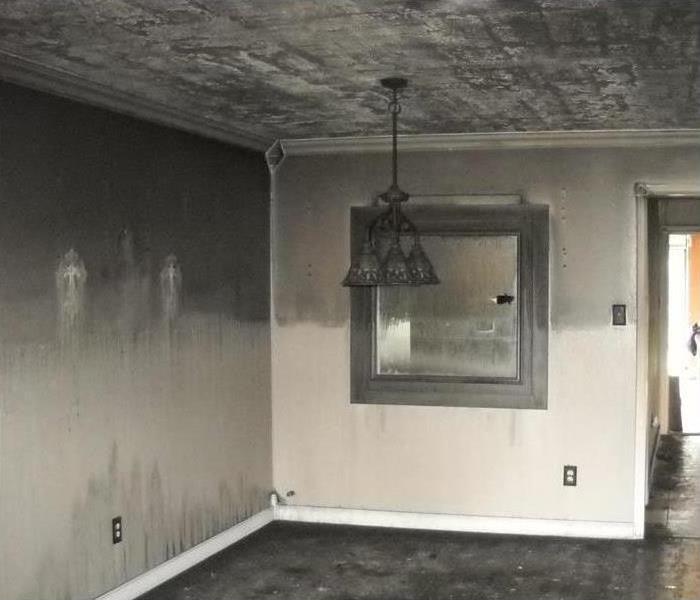 Please call SERVPRO of E. Vancouver / Clark Co. 24/7 365 days a year! (360) 695-4418
Please call SERVPRO of E. Vancouver / Clark Co. 24/7 365 days a year! (360) 695-4418
After a fire, your house is left with lingering smoke that can be harmful to your health and property. The best thing to do in such a situation is to clean smoke immediately because if you ignore it, the smoke will cause massive damage on your property which will require more money to clean than if you had cleaned it soon enough. If the smoke is not cleaned as soon as possible, the items that will be mostly affected by smoke are drapes, carpets, upholstery and walls because they will become permanently discolored. Glass will become extremely etched, and metals will tarnish which will require replacement.
You might think that you can do a good job at cleaning smoke by yourself without any basic knowledge and skills on how to go about it but this can lead to you causing further damage on the items. The best thing to do will be to hire experienced SERVPRO professionals to do the cleaning and restore the home to the state it was in before the fire disaster struck.
One of the advantages of using SERVPRO experts to clean soot is that we have specialized tools which are crucial in eliminating smoke. These are tools such as extractors, rotary scrubbers, and wet cleaning tools. Another advantage is that we have a lot of experience in doing such work; therefore, we will know the right steps to take in cleaning your home and preventing further damage on your property.
Indeed, bringing in a SERVPRO professional on site will save you a lot of headaches and ensure that you get rid of smoke and fire damage efficiently. Please call SERVPRO of W. Vancouver / Clark Co. 24/7 365 days a year! (360) 695-4418
Home Fire Facts
1/9/2017 (Permalink)
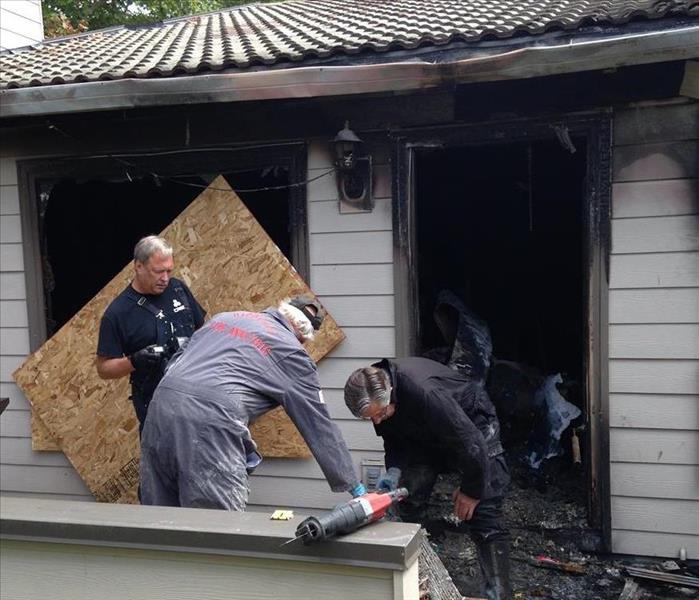 Prevention!!
Prevention!!
SERVPRO: Proud National Sponsor of American Red Cross ready Rating Program.
Home Fires, america's Biggest Disaster Threat.
* Nearly 47,000 fires occur during the winter holidays claiming more than 500 lives, causing more than 2, 200 injuries, and $554 million in property damage. **
* On average, one of every 22 home fires started by Christmas trees result in death. **
*Candle fires are four times as likely to occur during the winter holidays. **
* During the winter holiday season an average of 40 home fires per day are caused by children playing. **
* The number of home fires the American Red Cross has responded to has risen 10% since 2000. *
* Having a working smoke alarm reduces one's chances of dying in a fire by nearly half. **
Sources: American Red Cross, * U.S. Fire Administration ,** and the National Fire Protection Association .***
For further questions or help with fire clean-up needs, please contact SERVPRO of W. Vancouver/Clark Co. 360-254-0049






 24/7 Emergency Service
24/7 Emergency Service



















